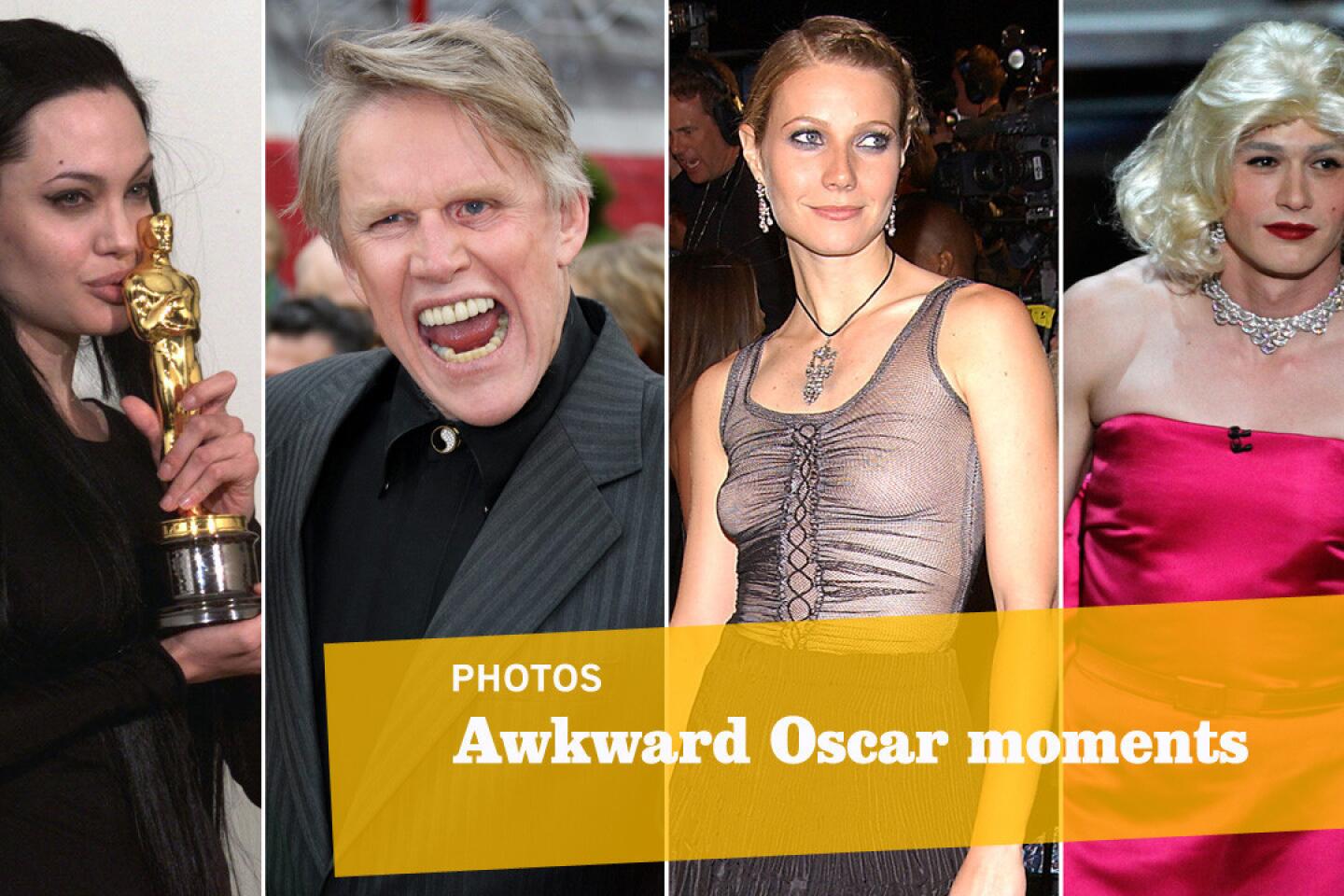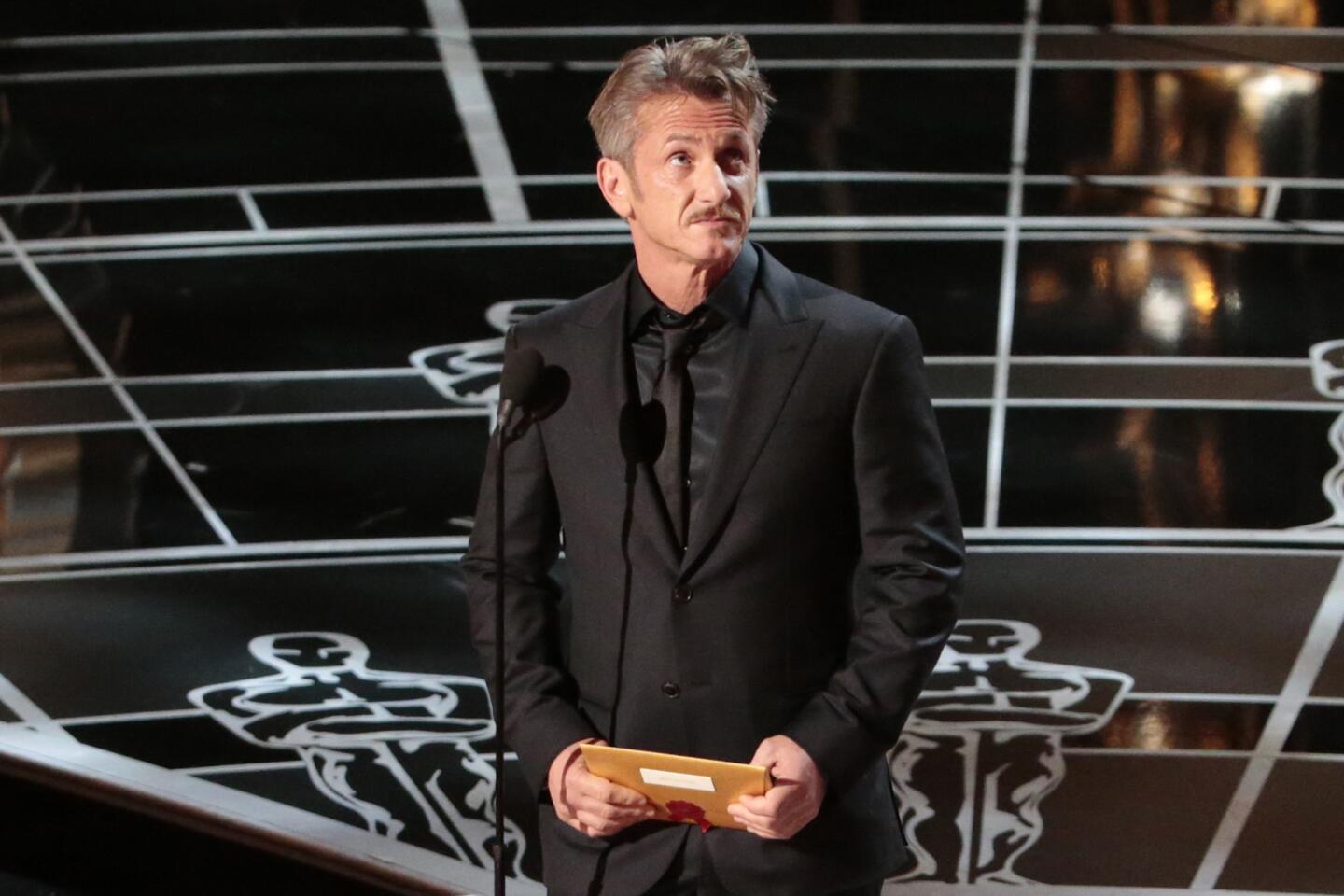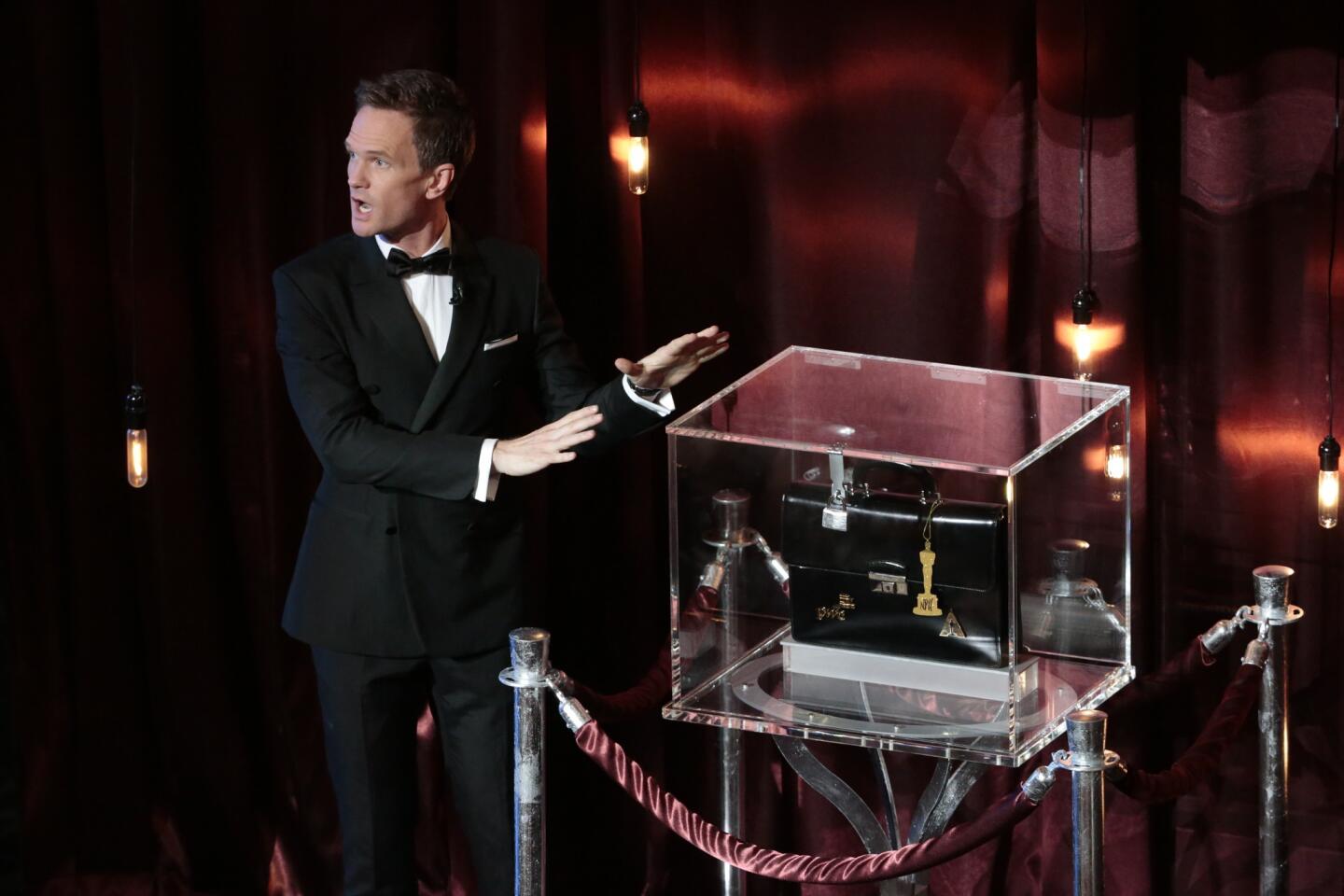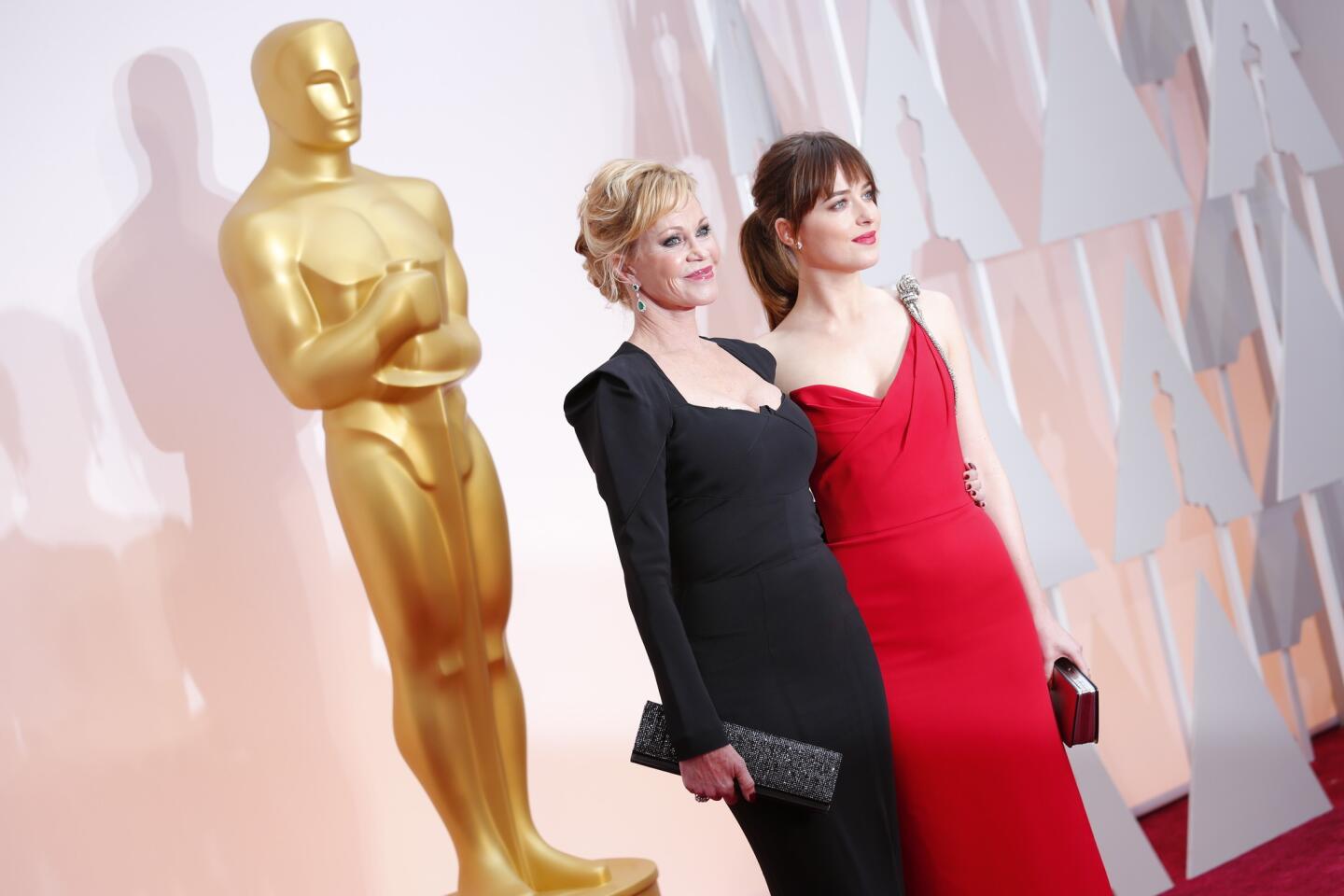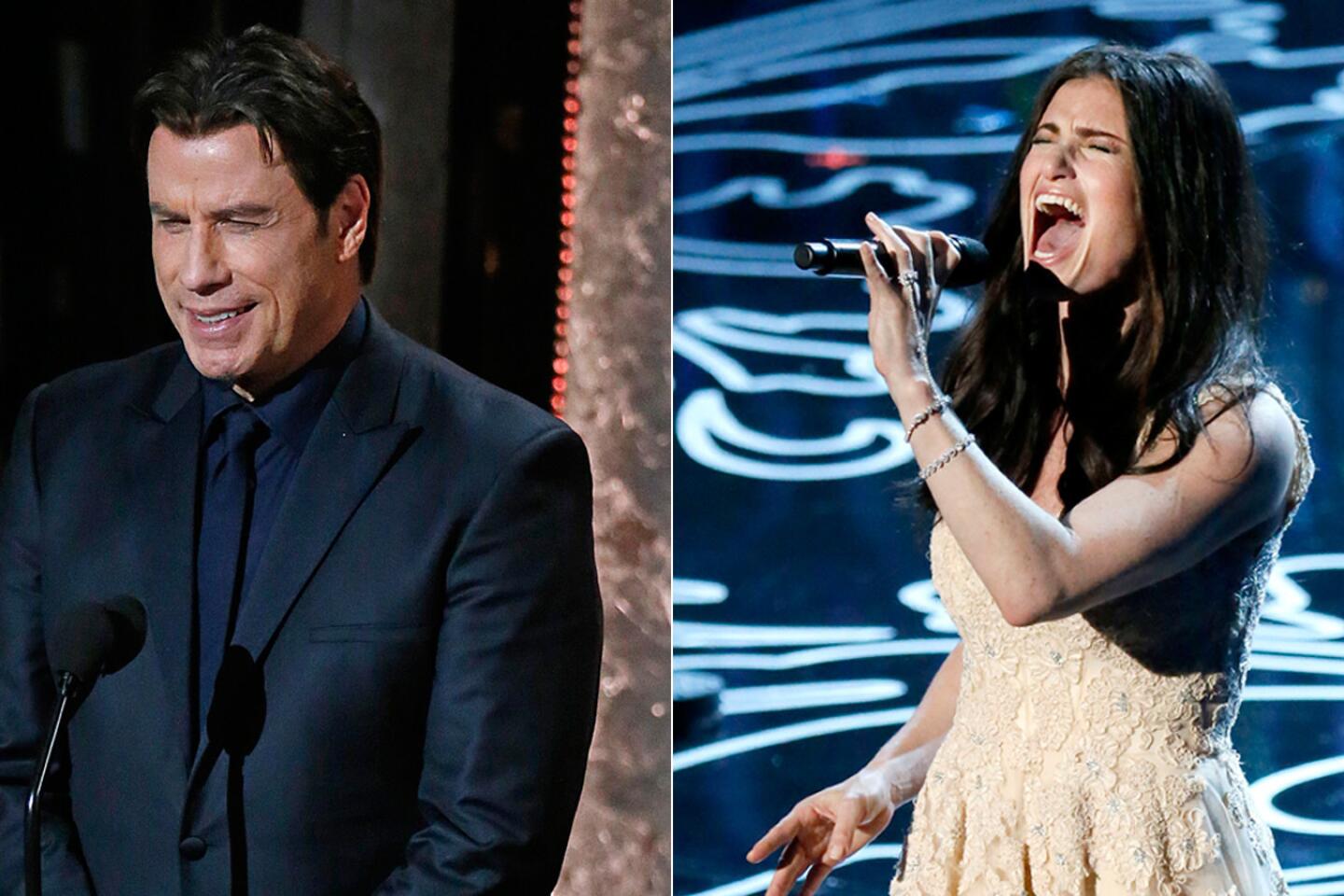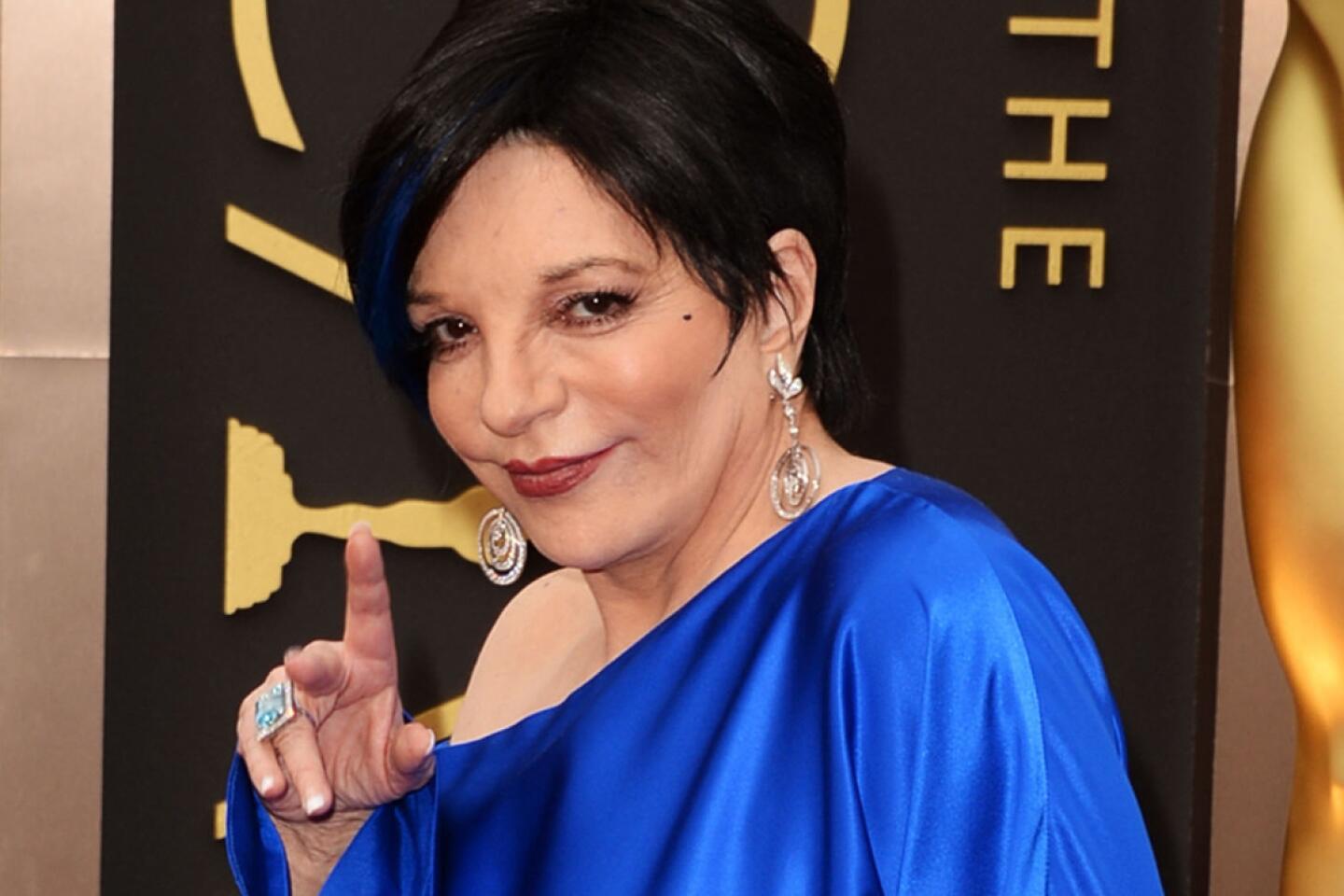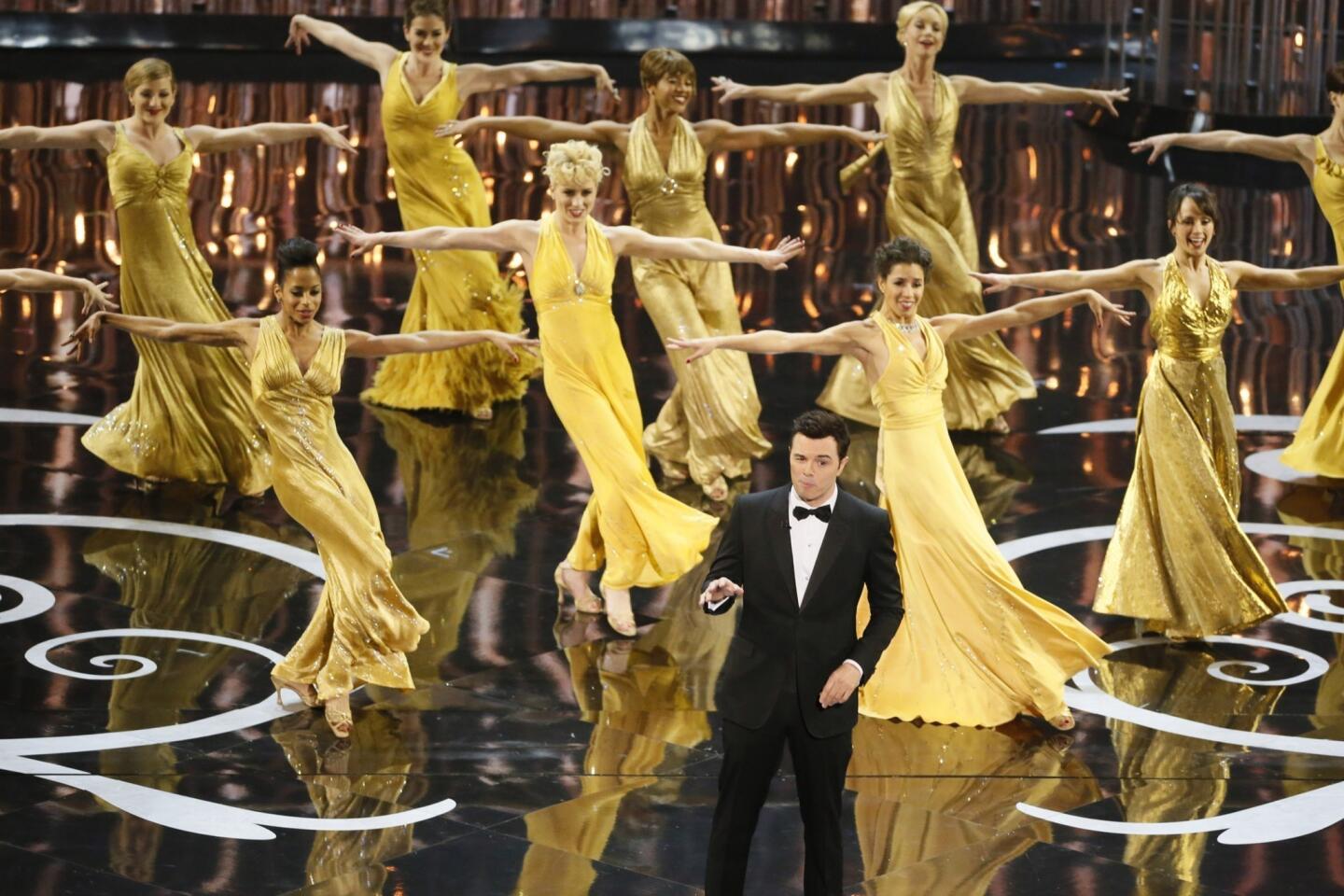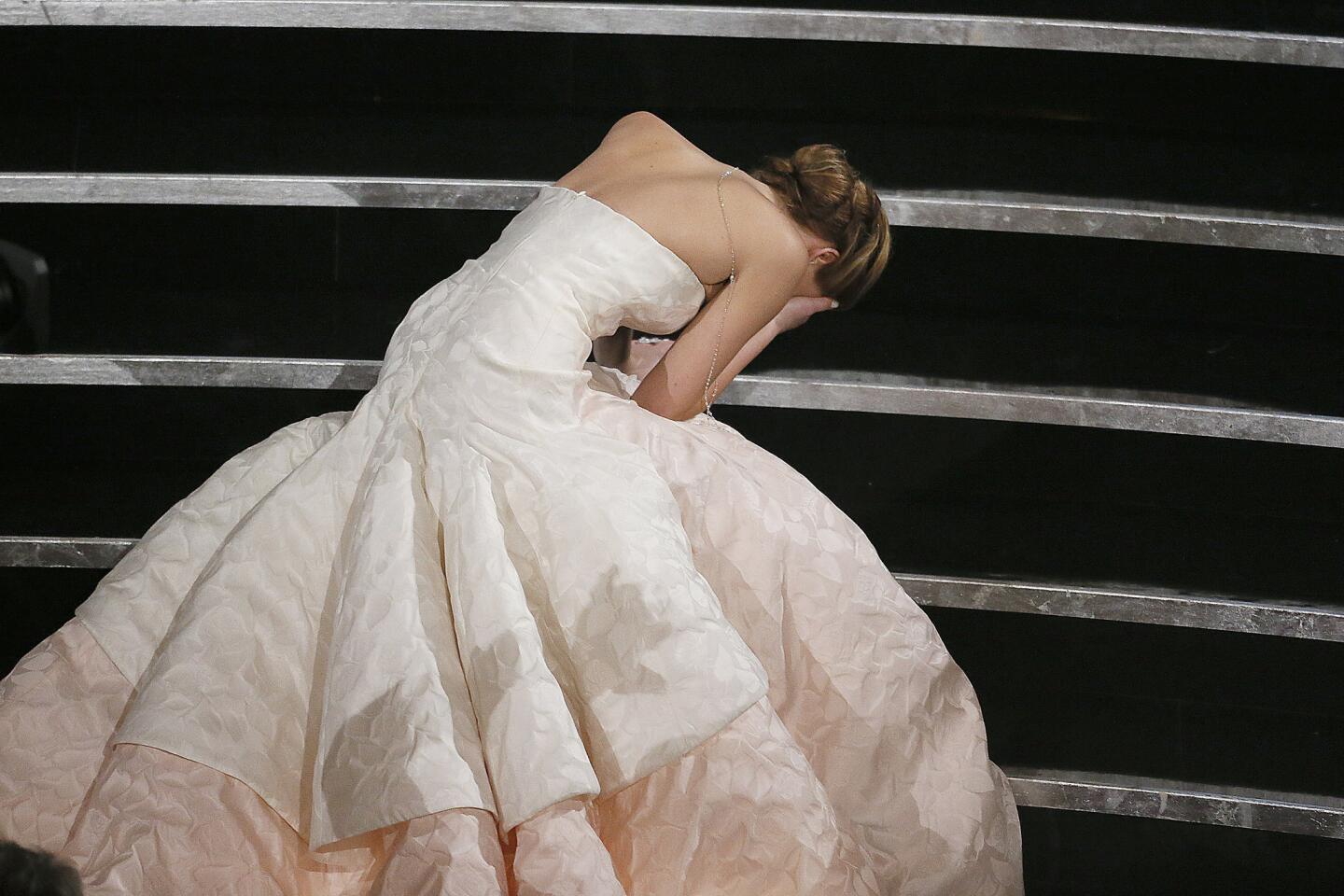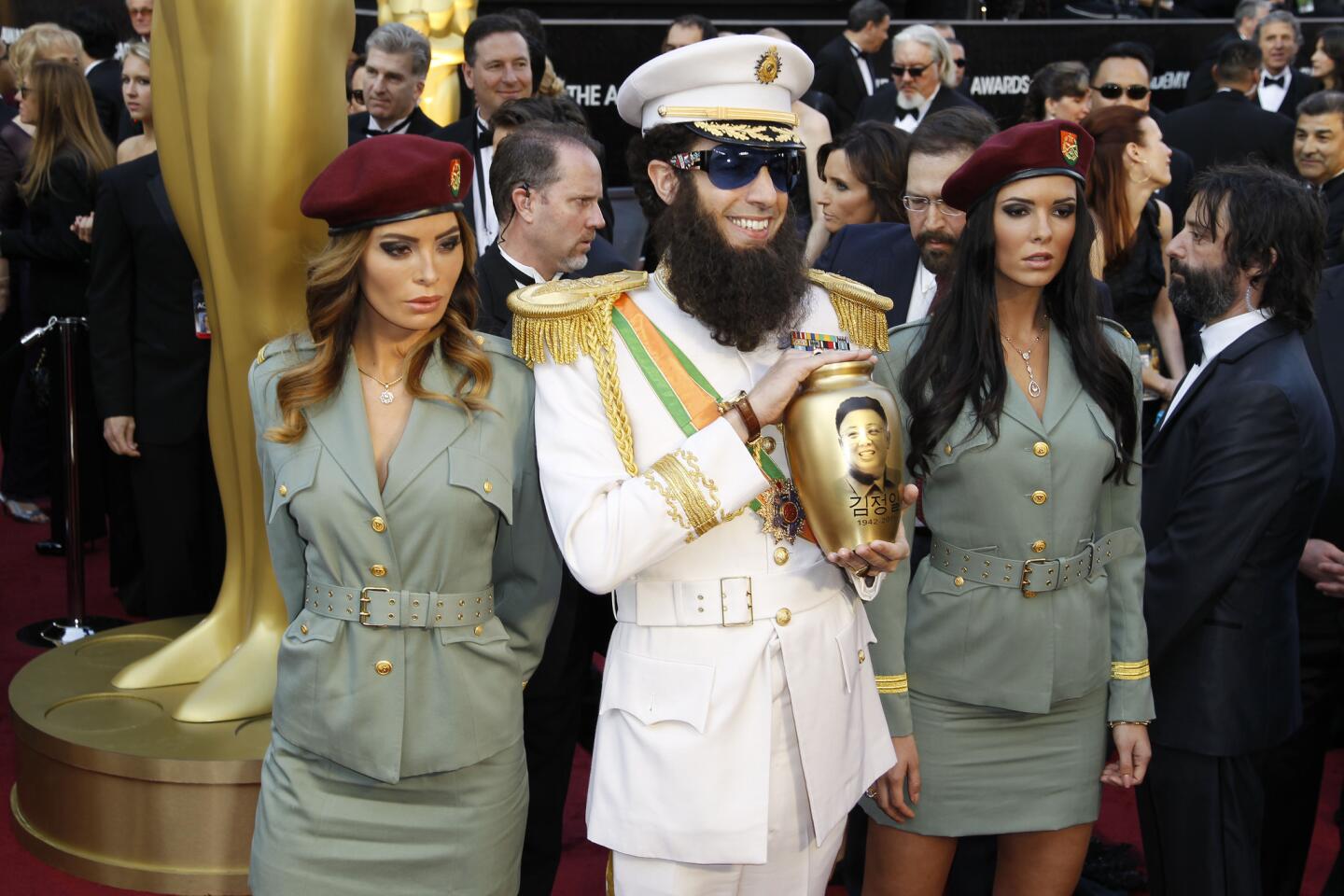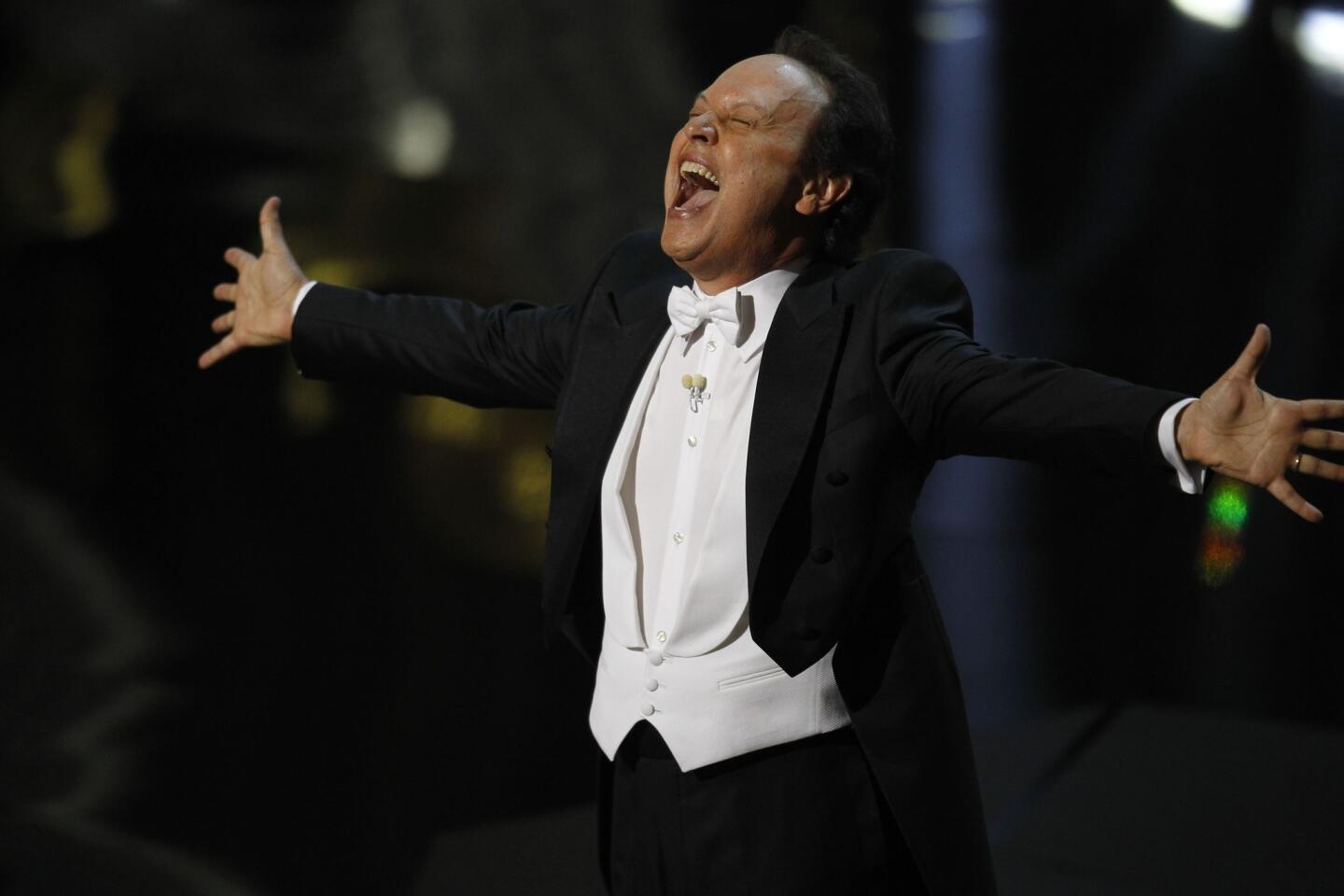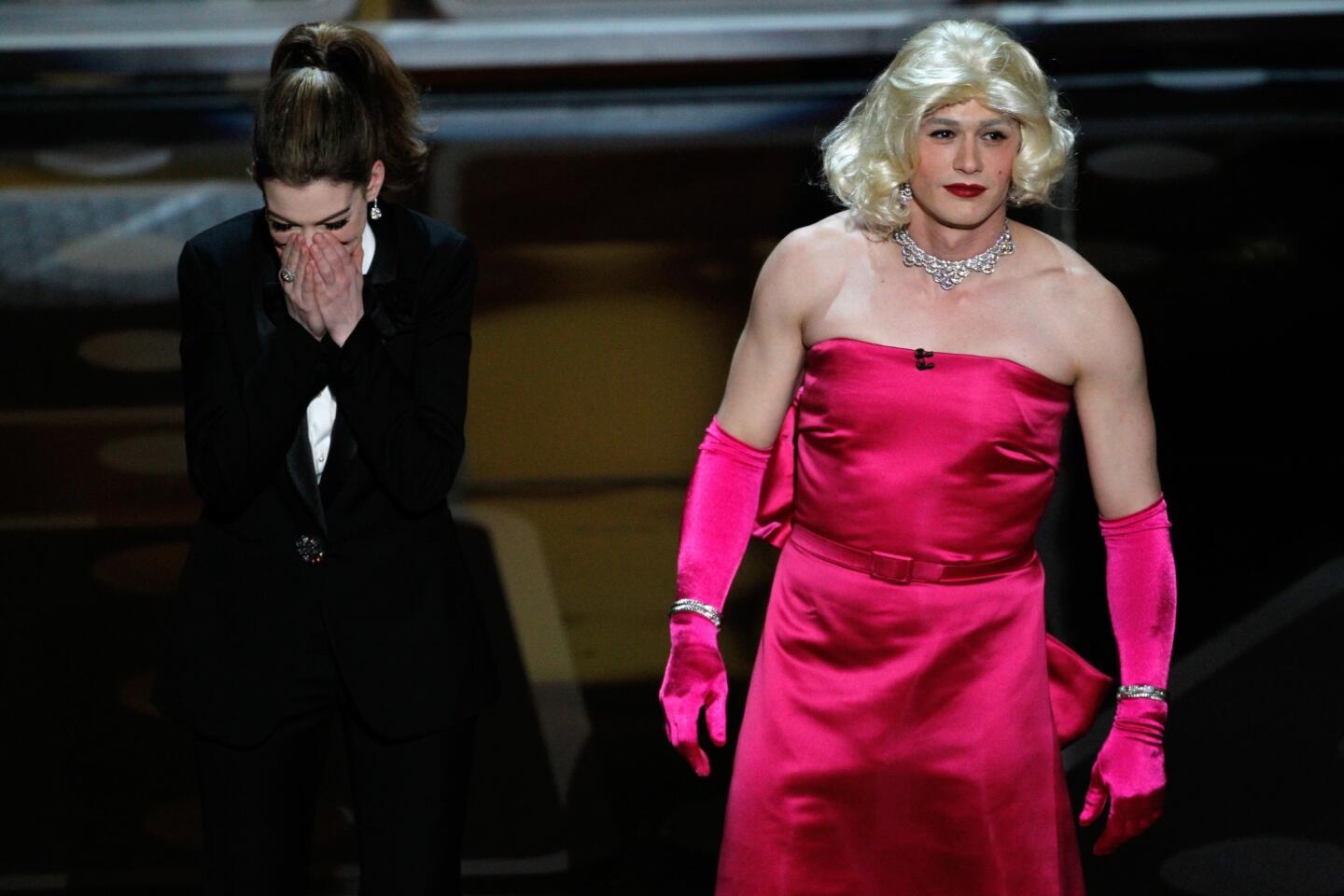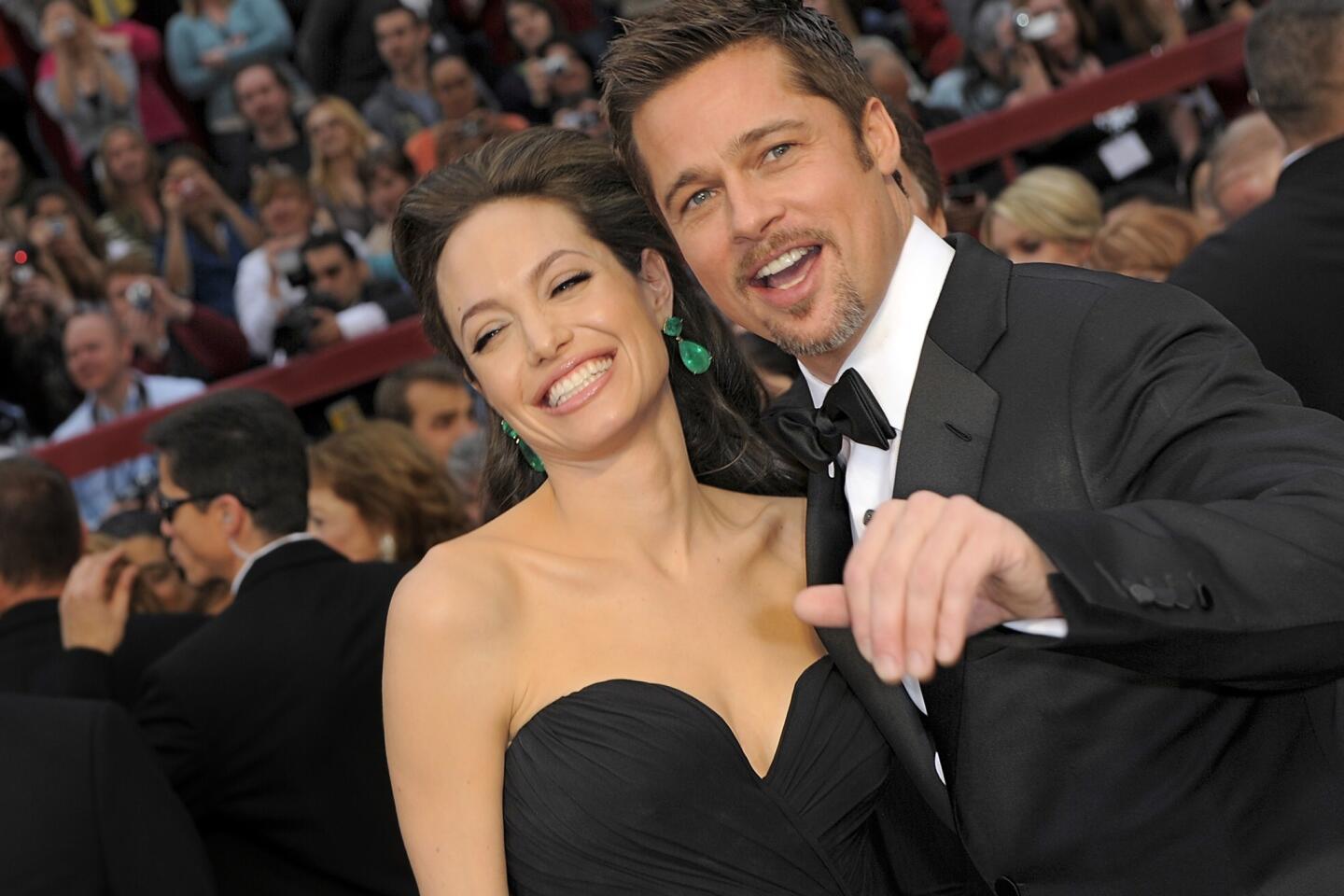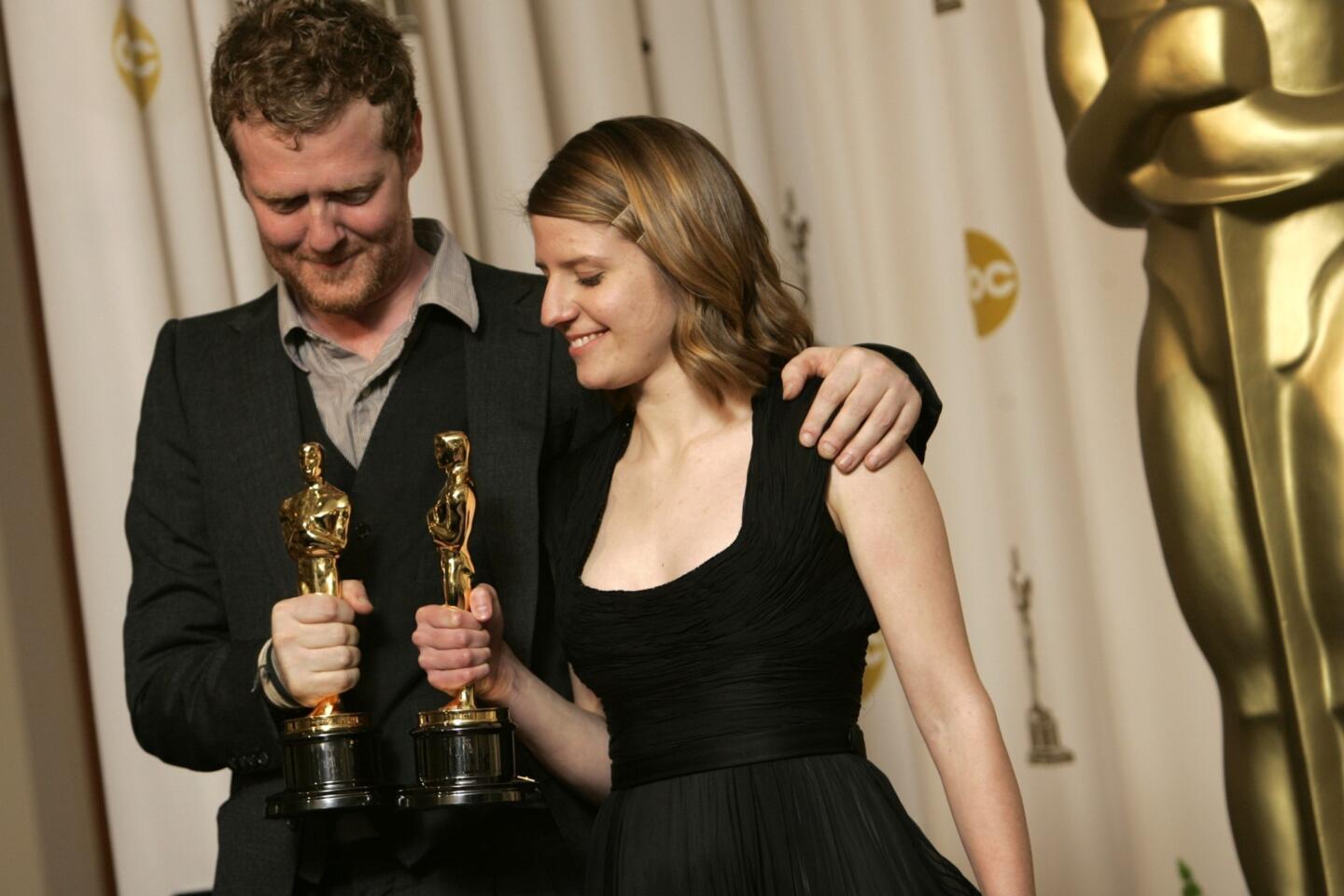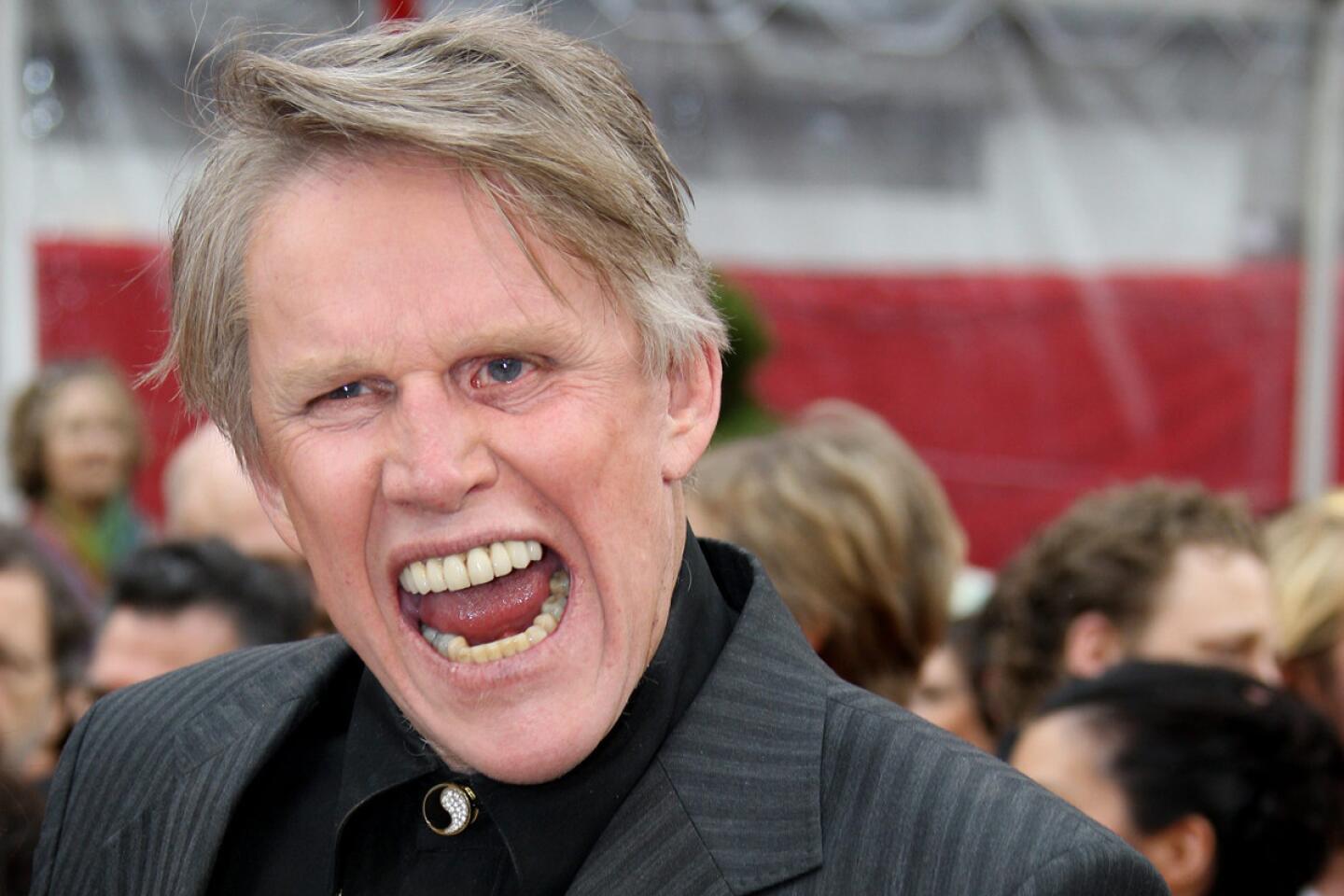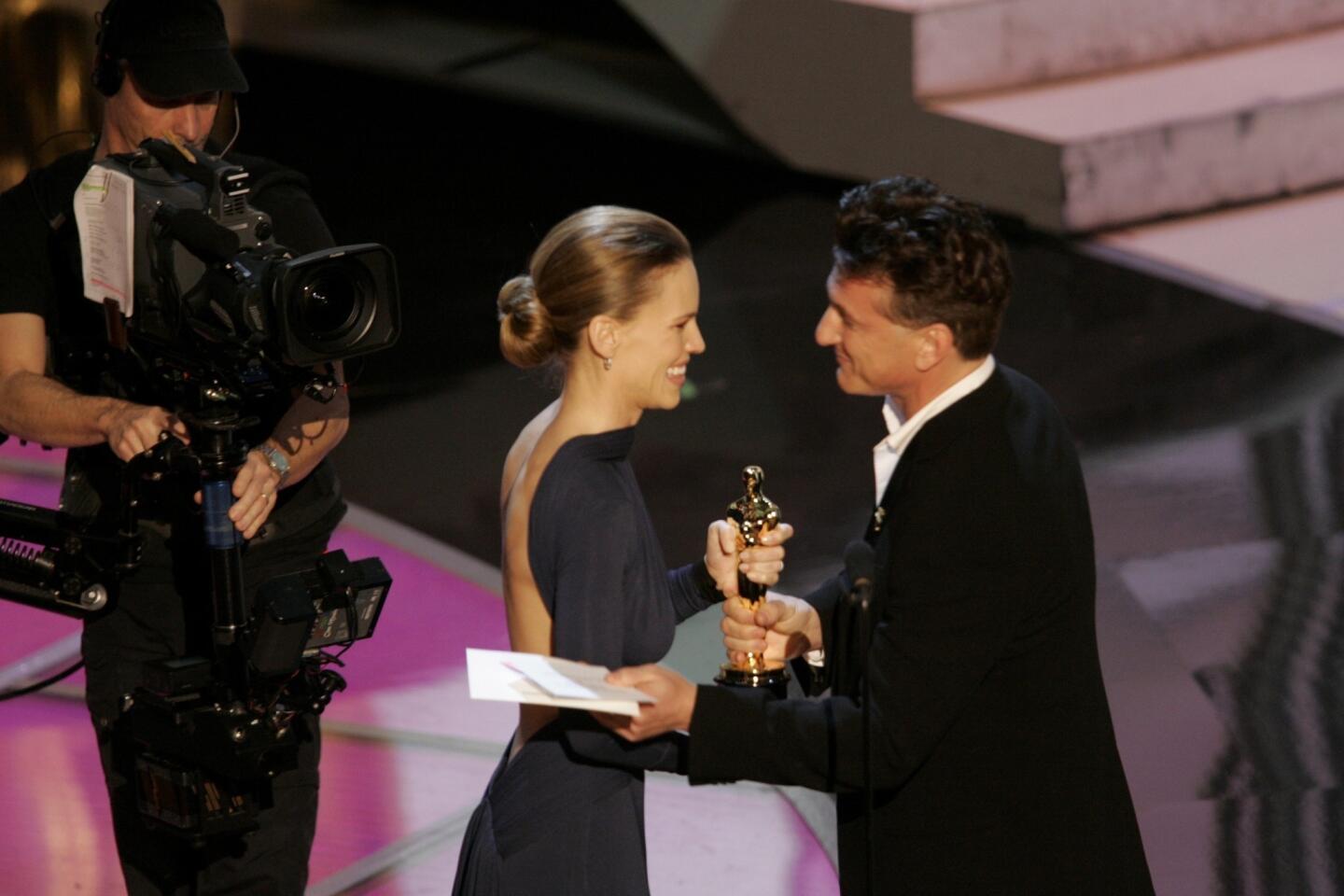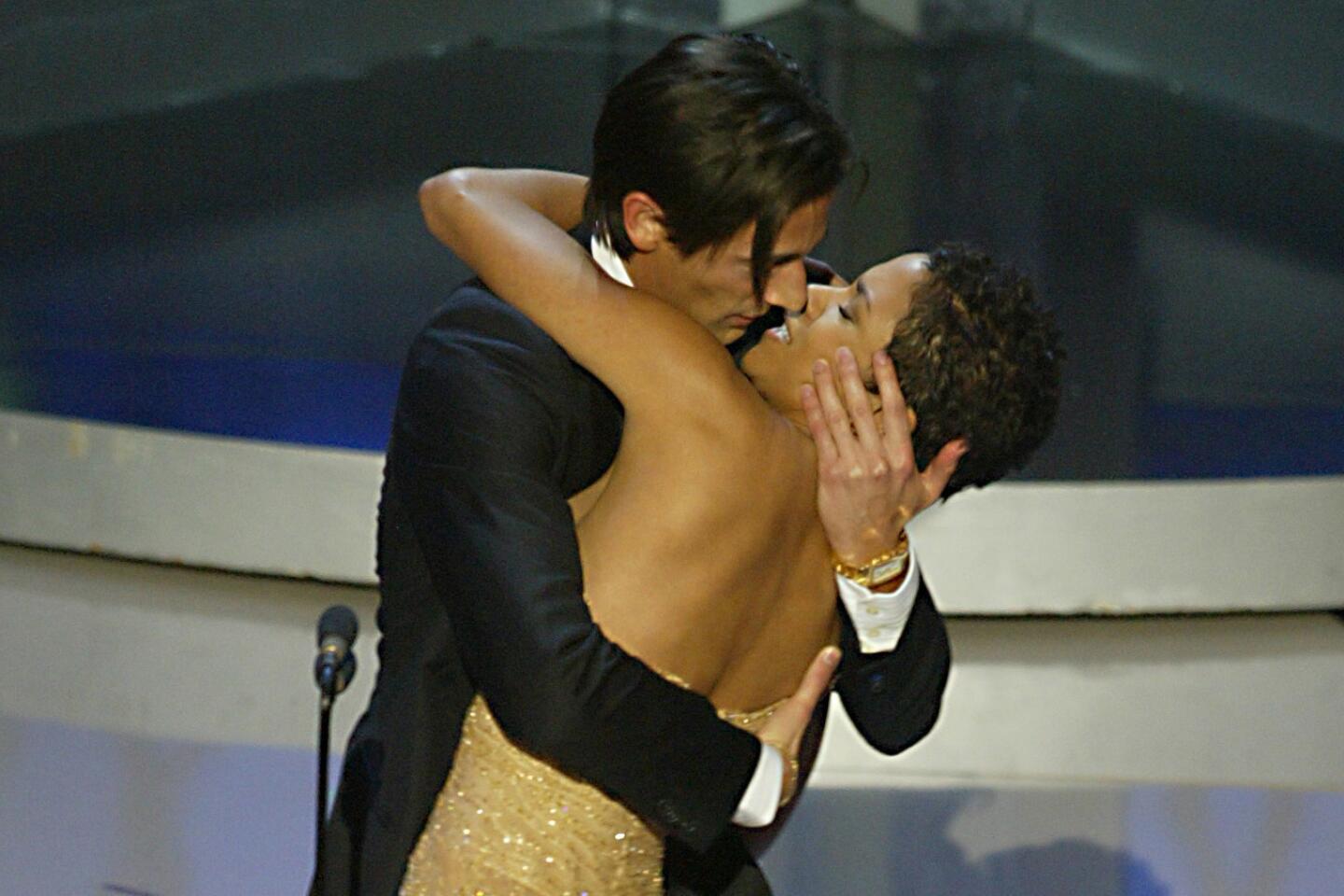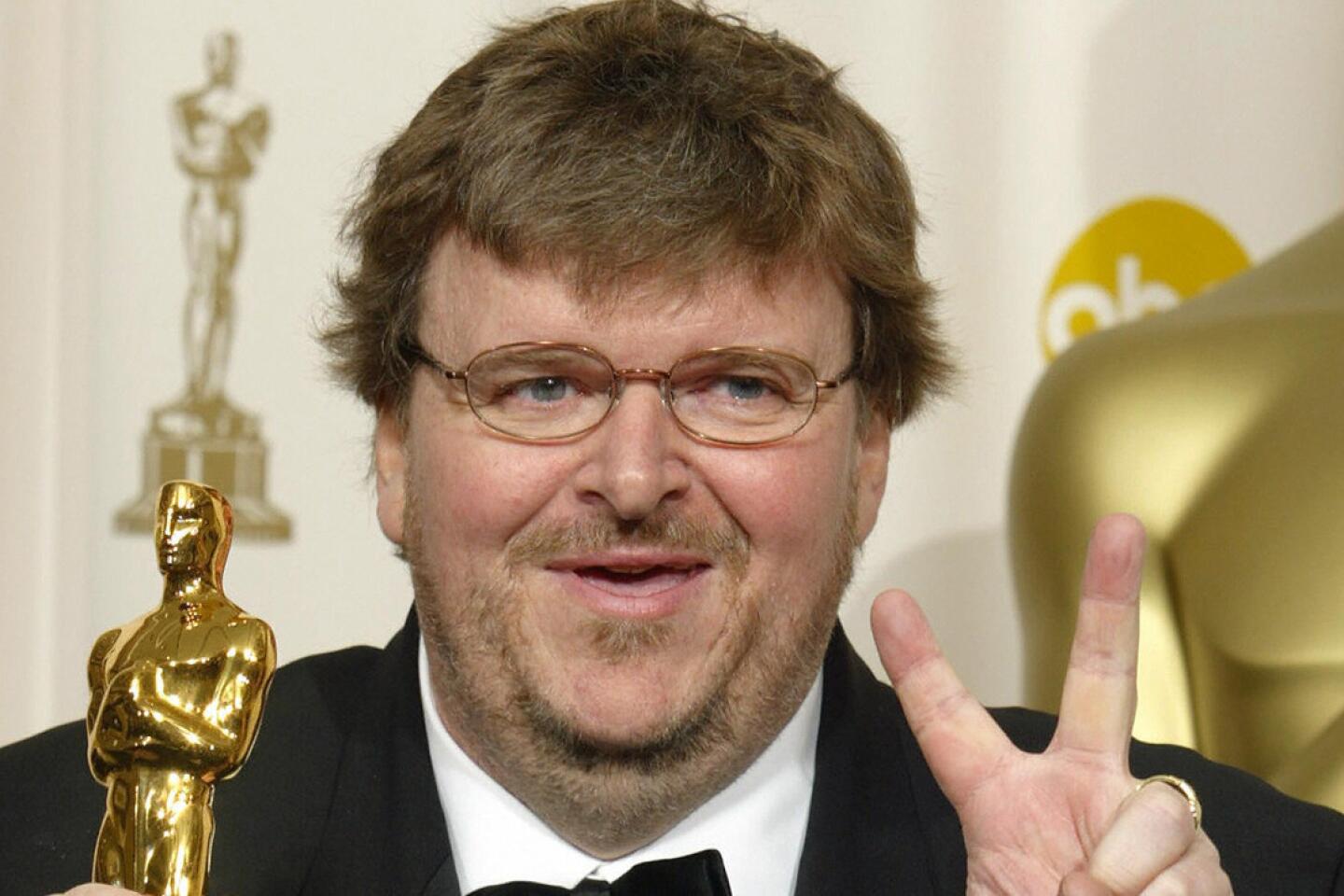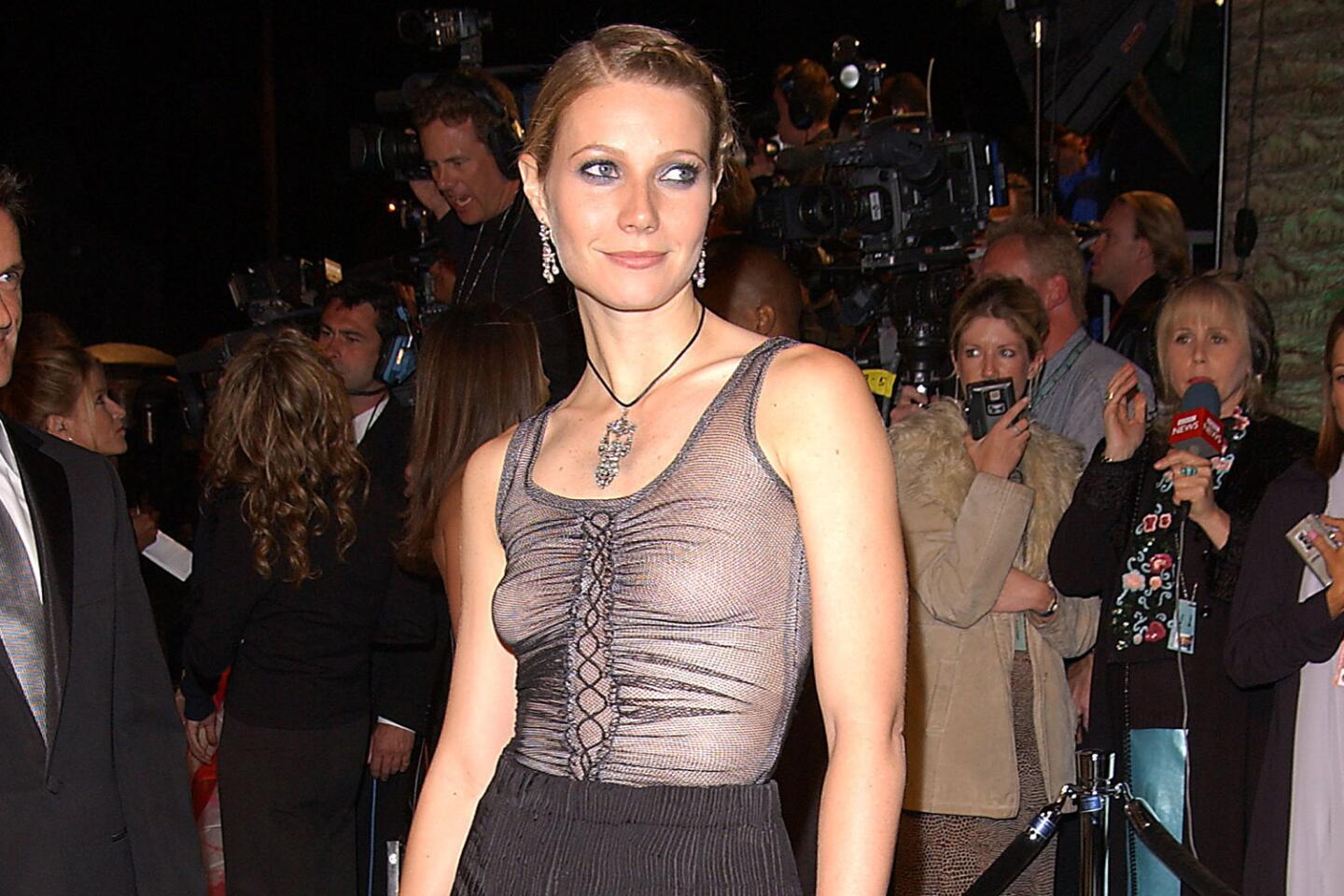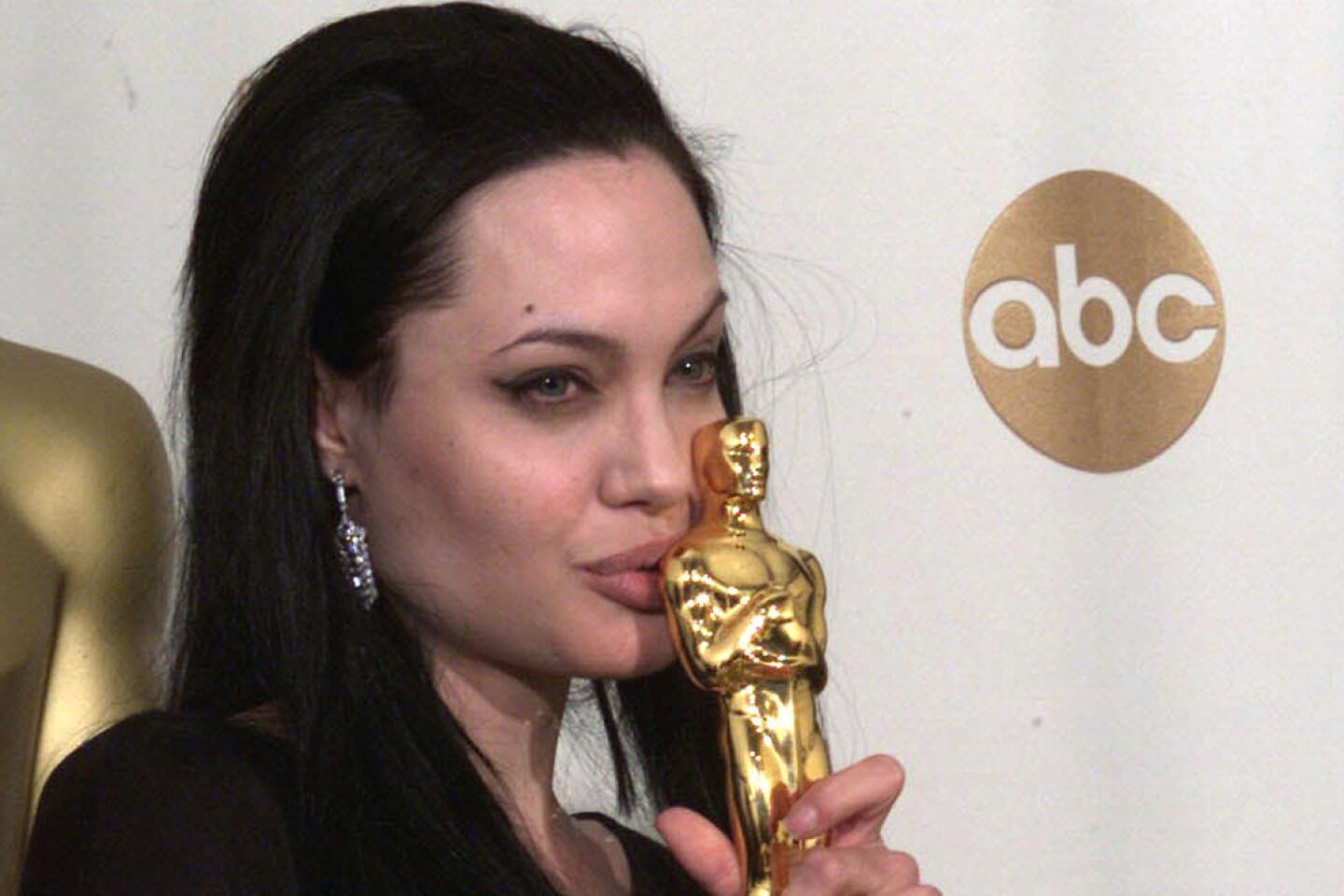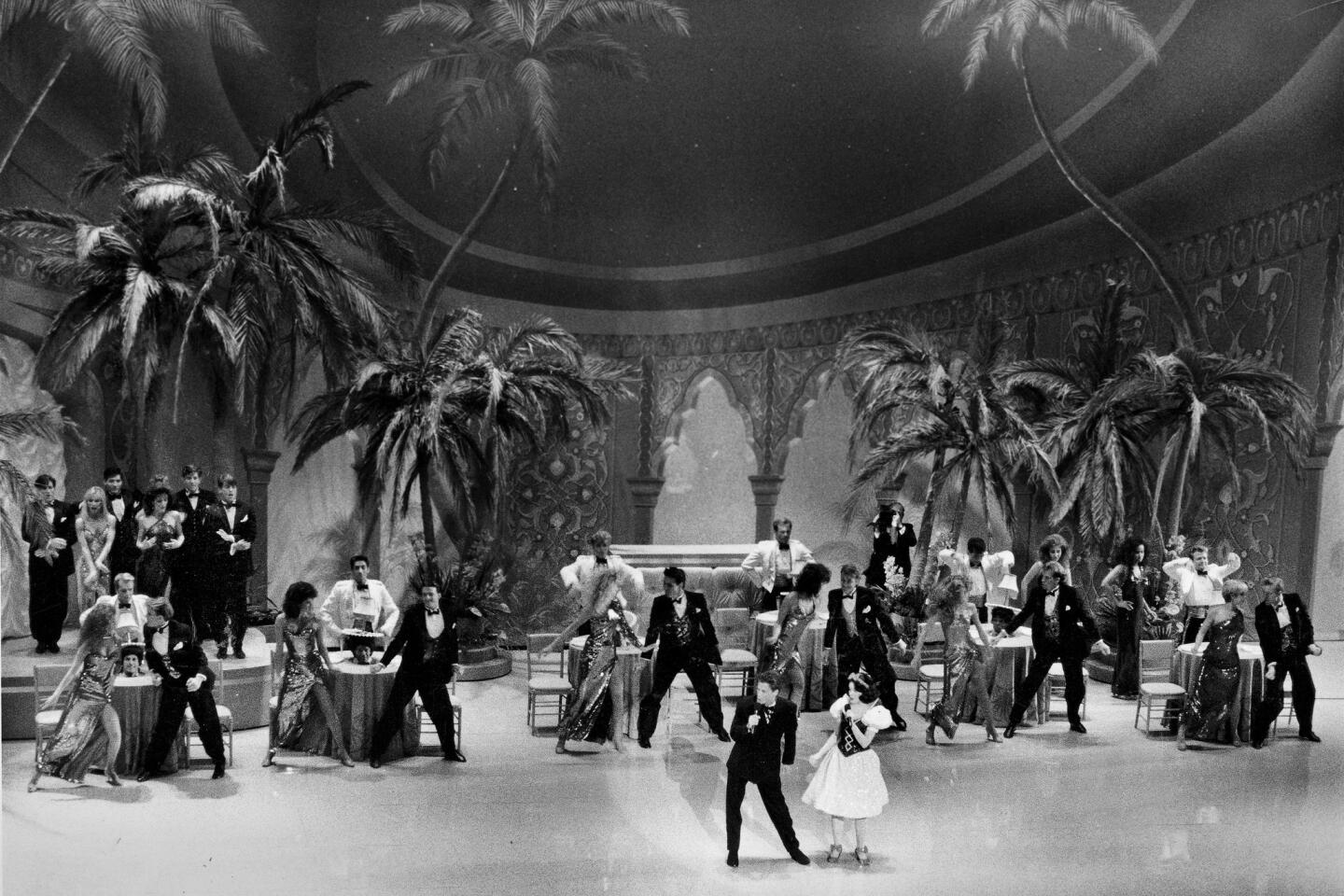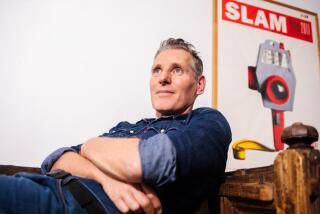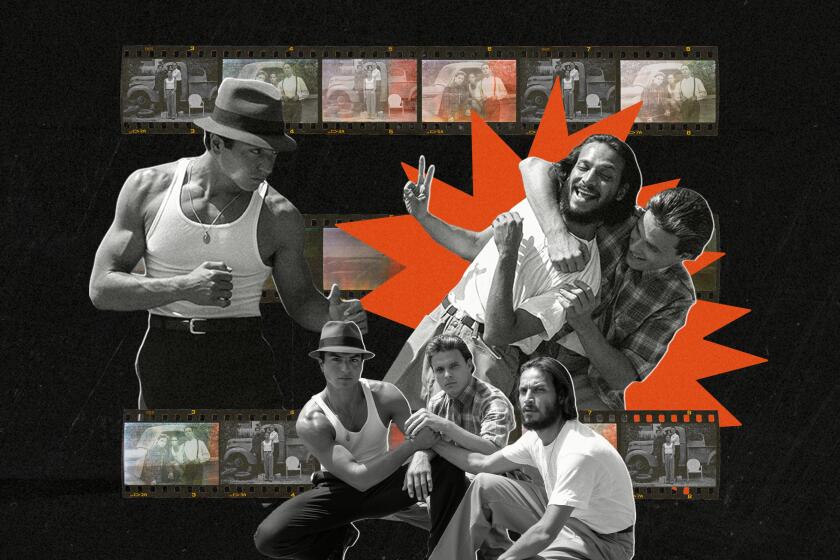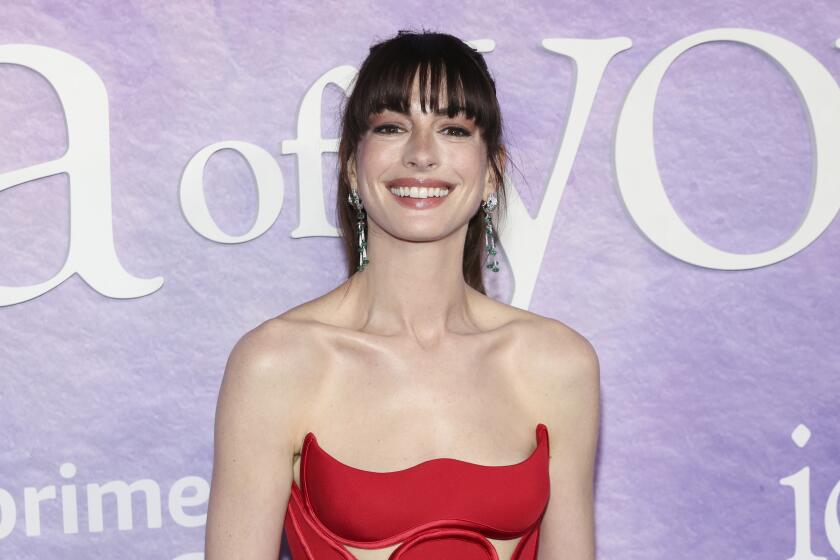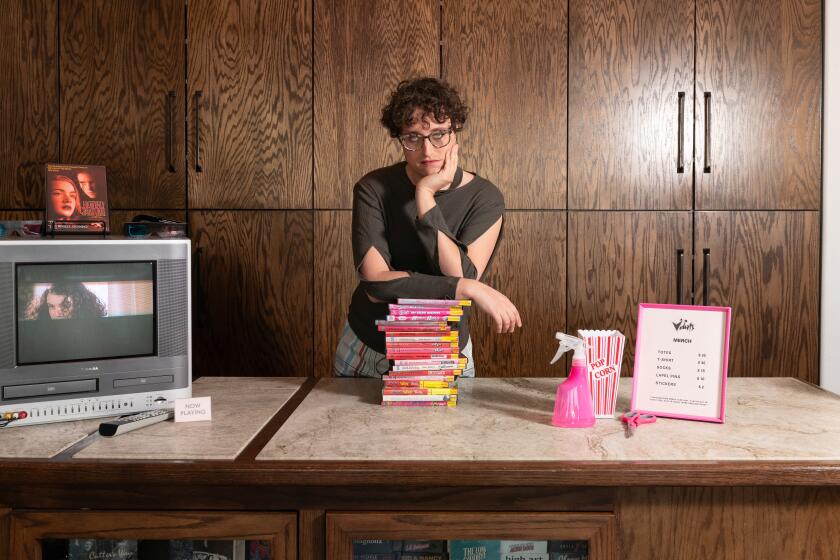You may not remember them, but they’ll never forget winning an Academy Award
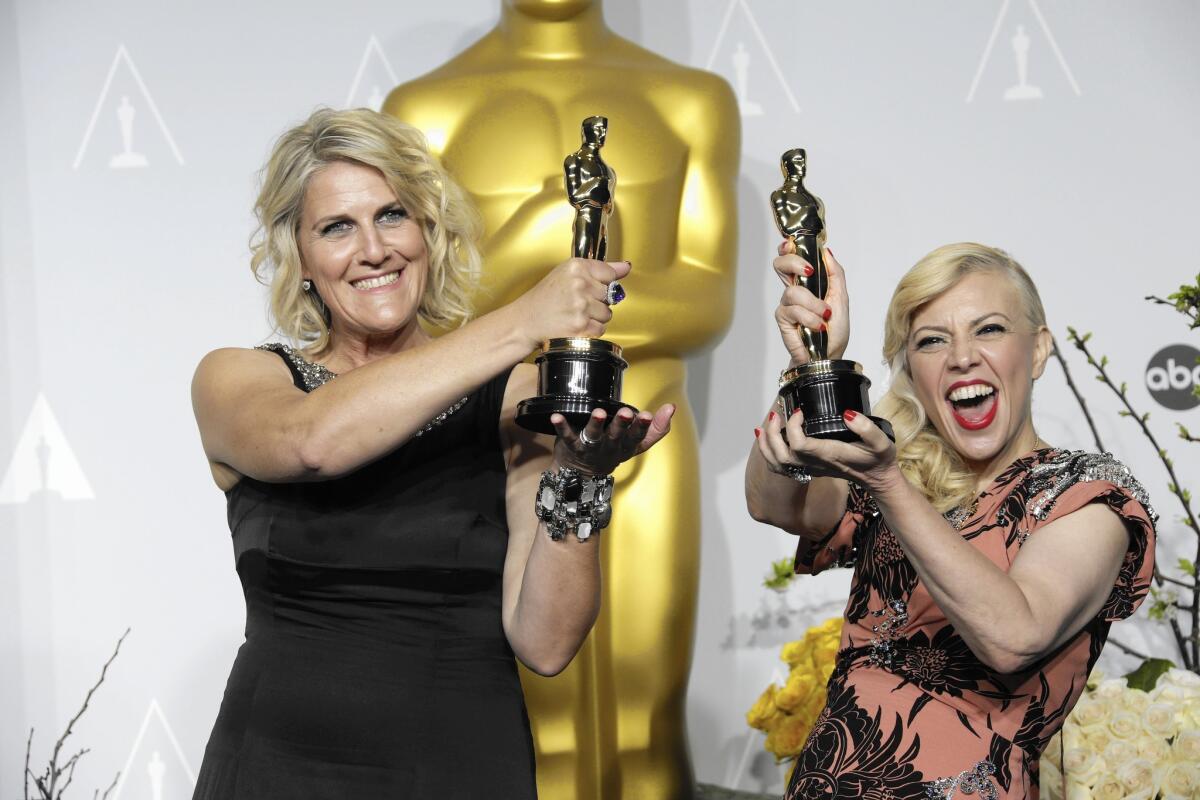
Beverly Dunn, left, and Catherine Martin show off their Oscars for production design for “The Great Gatsby” on March 2, 2014.
It’s an unforgettable moment for them — even if it’s quickly forgotten by most others.
“Below-the-line” Oscar winners, nicknamed for their salary rank on a movie budget, rarely earn the trumpeting enjoyed by their celebrity counterparts. That’s because they’re awarded for excellence in celebrity-free categories such as sound editing, film editing, set decoration and visual effects. Their brief time at the podium often plays to TV viewers like a good time for a bathroom break.
Their Oscar stories, though, are reassuringly grounded in real life, which somehow makes their win all the more magical. They’re the ones who don’t have publicists to script their evenings. They feel slightly ridiculous in tuxedos and couture gowns. They go to every after-party they can, then, like Cinderella, they come home and roll out the garbage cans. They fall into bed with their Oscar on the pillow next to them.
We talked to seven previous winners about their fantastic, if fleeting, Oscar experience.
OSCARS 2016: Full coverage | List of nominees | #OscarsSoWhite controversy
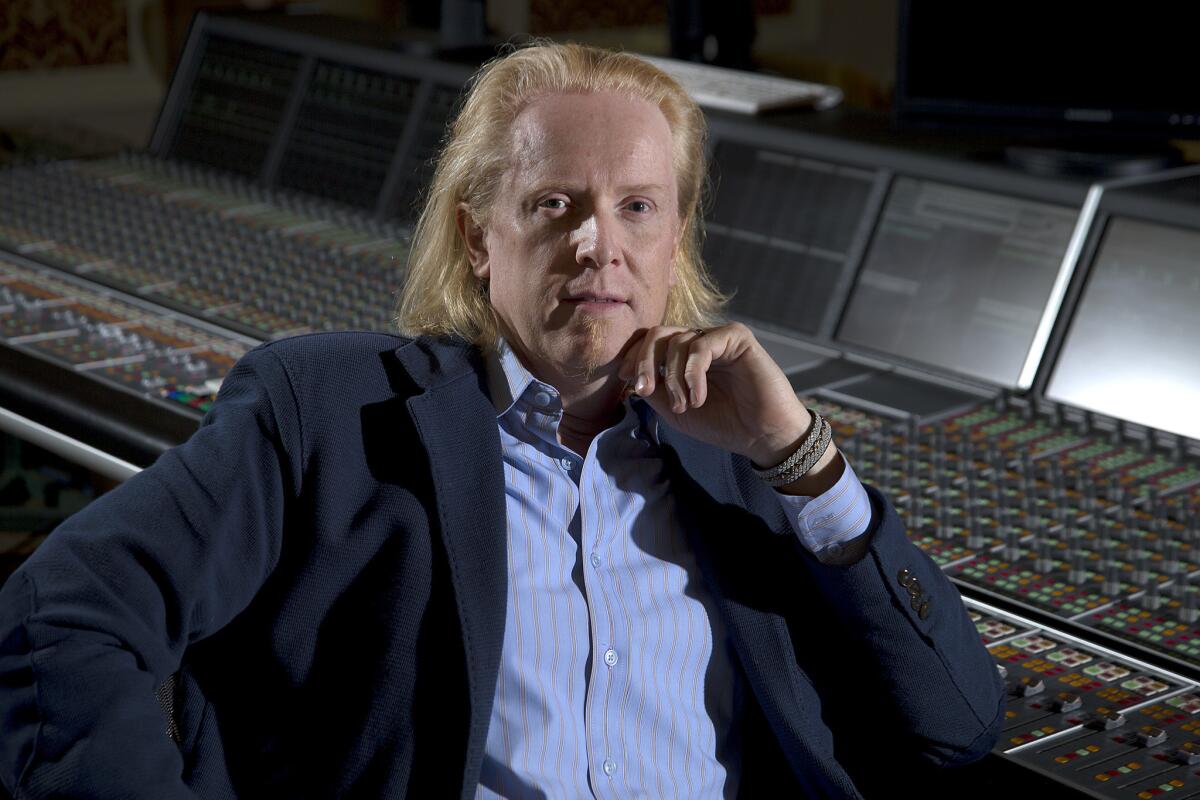
Paul Ottosson won an Oscar for sound editor/sound mixer for “The Hurt Locker” and another for “Zero Dark Thirty.”
Name: Paul N.J. Ottosson
Oscar: Sound editing and sound mixing, 2009, for “The Hurt Locker”
What was your greatest fear when you got called to the stage?
Am I going to hold up emotionally? Am I going to be crying like a little baby? Am I going to be standing up there stammering and not knowing what to say? It was a big fear, let me tell you. It was to the point, I was thinking, “I don’t know if being awarded the Oscar is worth it.”
What was it like looking out on that crowd?
Humbling. You stand up there, and I see the faces of all these people I’ve been growing up watching in movies. It finishes up being a great feeling. But when you walk up there, a lot of emotions come up.
How did you prepare?
I went over what would I say in my head a million times a day. Showering. Driving to work. I come up to the stage, and I don’t remember a single word. Not a single word. When I start talking, I don’t even hear my voice. I don’t know what I’m saying. It’s just a surreal experience. Someone said it was on YouTube. I waited a year and a half until I finally watched it.
Who did you forget to thank?
Mom and Dad. Mark Boal, the writer-producer. My crew, also. … Being up on that stage, I will forgive anyone for any speech. What you intended and what you say could be completely different things.
What was most surprising about the whole experience?
How small it made me feel in a way. It’s like you’re a small part of something bigger.
See the most-read stories in Entertainment this hour >>
What happened the next day?
My son Theo wakes me up and sees the two Oscars. He picks up one and says, “One for Mommy. One for Daddy.” Then he looks at me and says, “Daddy, where is mine?” I kind of love that because it was just a big shiny thing to him.
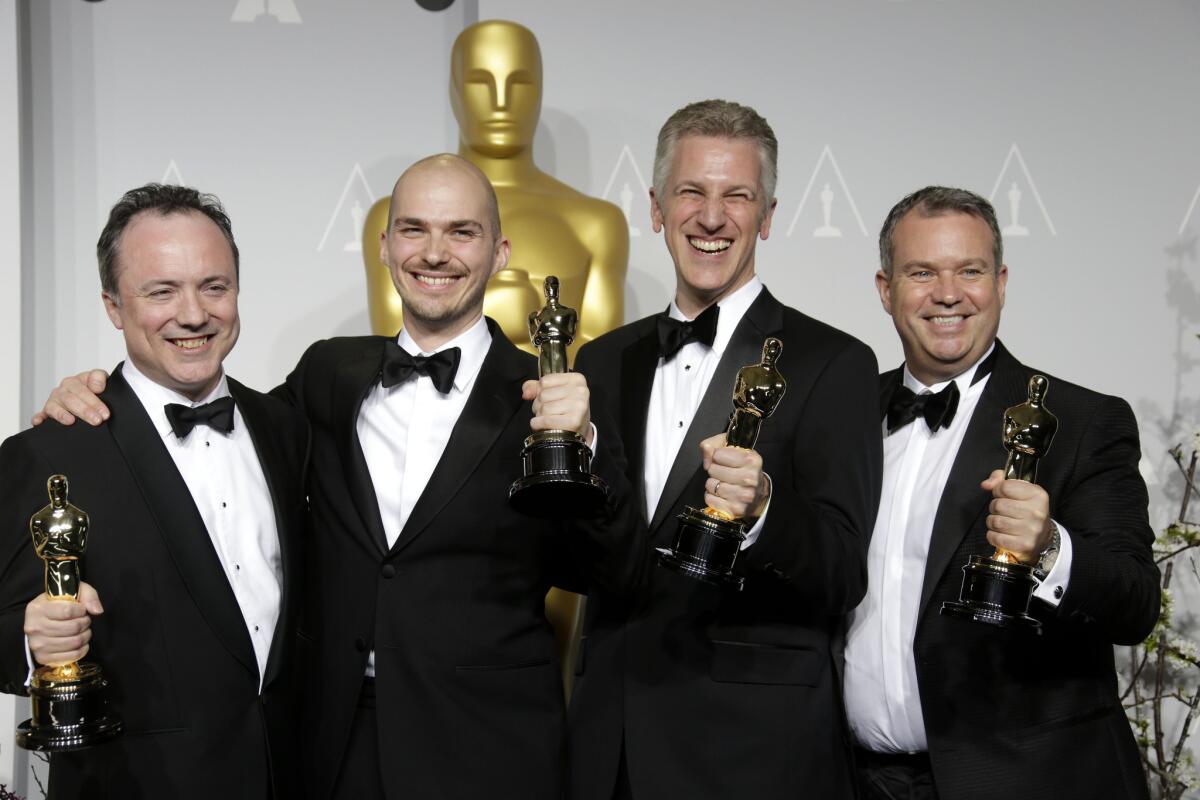
From left, Tim Webber, Chris Lawrence, Dave Shirk and Neil Corbould grip their Oscars for best visual effects during the 86th annual Academy Awards on March 2, 2014.
Name: Tim Webber
Oscar: Visual effects, 2013 [with Chris Lawrence, David Shirk, Neil Corbould], for “Gravity”
What was your greatest fear when you got called to the stage?
I was full of fear. It kind of ruins the evening right up until you’ve finished your speech. For me, it overtakes some of winning the award.
What was it like looking out on that crowd?
It was amazing. I did sort of take a moment when I was up there on the advice of Sandra Bullock. She had said to me a few days before to, during this process, make sure you take a moment to enjoy it.
How did you prepare?
Because you don’t normally get that much attention as a visual effects person, it’s incredibly frantic and busy. It’s a whirlwind. I now understand why people call it the awards season.
Who did you forget to thank?
There’s two parts of the speech. The short, timed one in public — I rehearsed that, and I got that right — but ‘round the back of the stage, you’re allowed to give a speech to thank all the people you don’t have time to thank on the stage. At that point, there was a whole department I completely forgot about.
What was most surprising about the whole experience?
The size of it. Way bigger than I’d registered before.
What happened the next day?
It had all been so busy and hectic leading up to the awards, it was very nice to just relax and enjoy the moment. And to respond to the huge number of “congratulations” messages that came flooding in. One unexpected and particularly enjoyable bonus of winning was the number of people whom I hadn’t been in contact with for years or even decades, who got in contact.
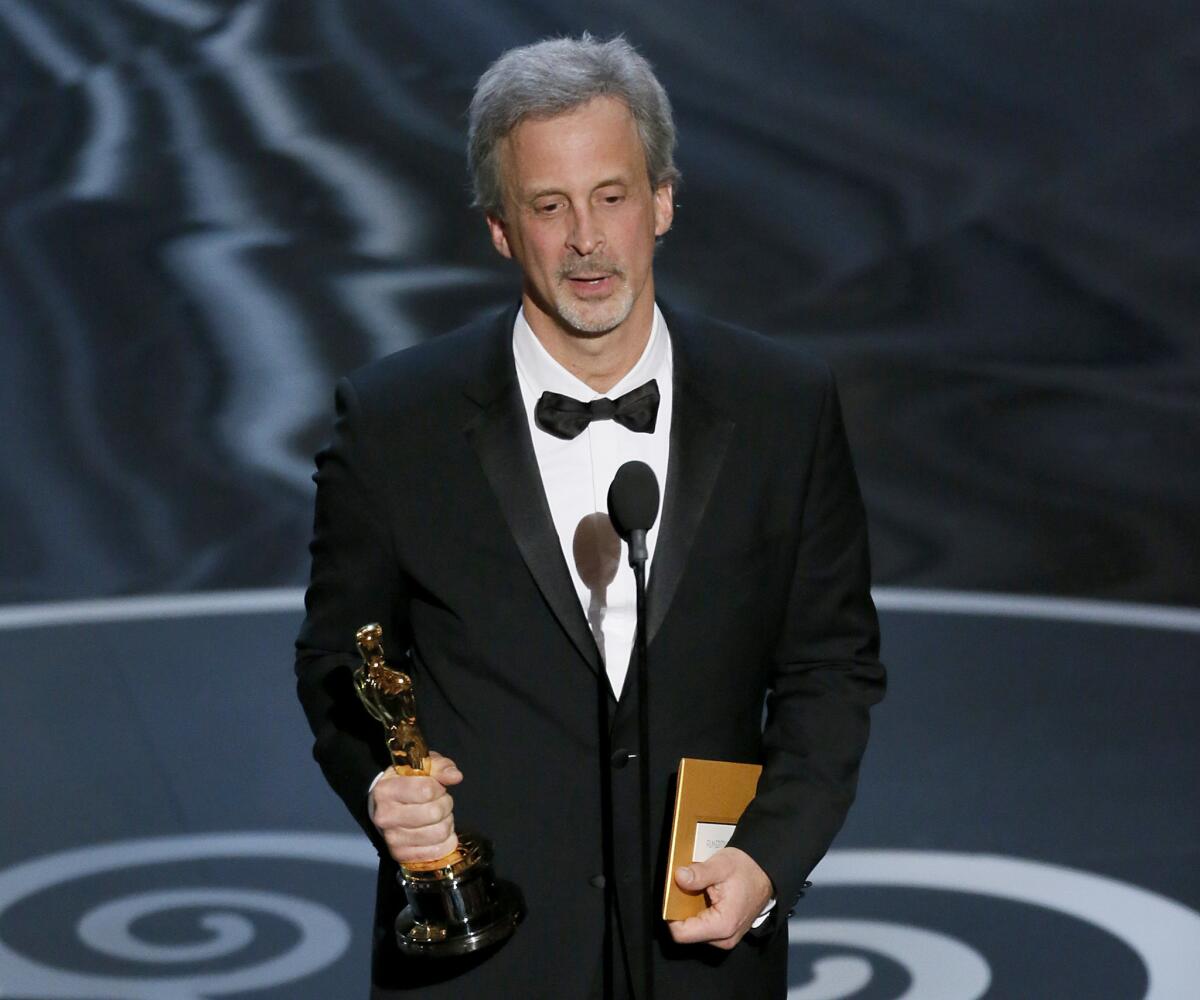
William Goldenberg wins an Oscar for film editing with “Argo” during the 85th annual Academy Awards on Feb. 24, 2013.
Name: William Goldenberg
Oscar: Film editing, 2012, for “Argo”
What was your greatest fear when you got called to the stage?
I was lucky enough to also win a BAFTA a few weeks earlier, and when I got onstage at the Royal Opera House in London, I made the mistake of looking out onto the crowd. I almost fell down. So my fear was that repeating itself.
What was it like looking out on that crowd?
I decided not to look out at all until I was done speaking. What I saw was the microphone and a lot of out-of-focus people. When I finished speaking, I allowed myself to look, just to remember it.
How did you prepare?
I was lucky enough to be nominated for two different films, “Zero Dark Thirty” and “Argo.” I memorized two speeches. I had one speech with a big Z on it and one with a big A in two different pockets, so just in case I froze, I would be able to pull the right one out.
Who did you forget to thank?
The executive vice president in charge of post-production at Warner Bros. Mark Solomon and my mom, who is now deceased, and I was really sorry about both of those.
What was most surprising about the whole experience?
I remember coming backstage and everybody’s treating you like you’ve just won the Nobel Peace Prize. You just don’t want it to end.
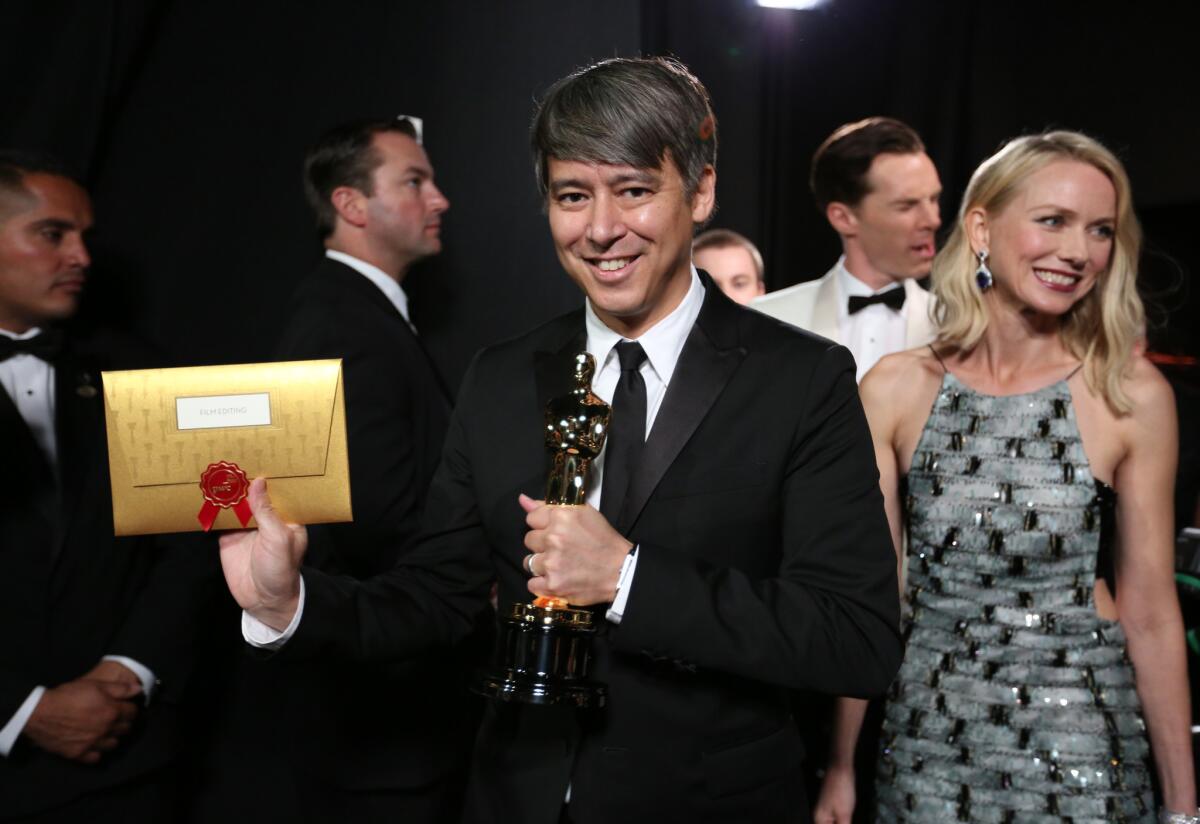
Tom Cross, who won for film editing for “Whiplash,” walks backstage with actress Naomi Watts at the 87th annual Academy Awards on Feb. 22, 2015.
Name: Tom Cross
Oscar: Film editing, 2015, “Whiplash”
What was your greatest fear when you got called to the stage?
I was afraid my 45-second speech would take me five seconds to say.
What was it like looking out on that crowd?
It was basically terrifying. I quickly remembered where the “Whiplash” team was sitting and where my wife was sitting, and after that, I spoke directly to them. Then it somehow became manageable.
How did you prepare?
I have two small children. So it’s almost impossible to find time to prepare for anything. I didn’t expect to win just because it doesn’t seem possible, this huge thing happening. I did figure out what I was going to say. The good news for shy people like me is you only have to fill 40 to 45 seconds. It’s not like anyone is expecting you to give a State of the Union speech.
Who did you forget to thank?
If I were to do it again, I’d probably say a couple more things about my mom. I did mention her by name, but I can never thank her enough. She was an artist who nurtured my creativity. She passed away about six months after I won. I feel very lucky she got to watch me on TV see my dream come true.
What was most surprising about the whole experience?
Winning. I still replay it in my head, and I can’t believe it. It was very surprising how kind everyone was before and after.
What happened the next day?
I had come down with a bad cold the weekend of the Oscars. By the time the Oscars rolled around, I was sick as a dog. Somehow I managed to pull it together for Oscar night. I loaded myself up on antibiotics, and the next day, I went to work on my next movie, David O. Russell’s “Joy” and brought the statue in for my assistant editors. On that day, we didn’t get much work done.
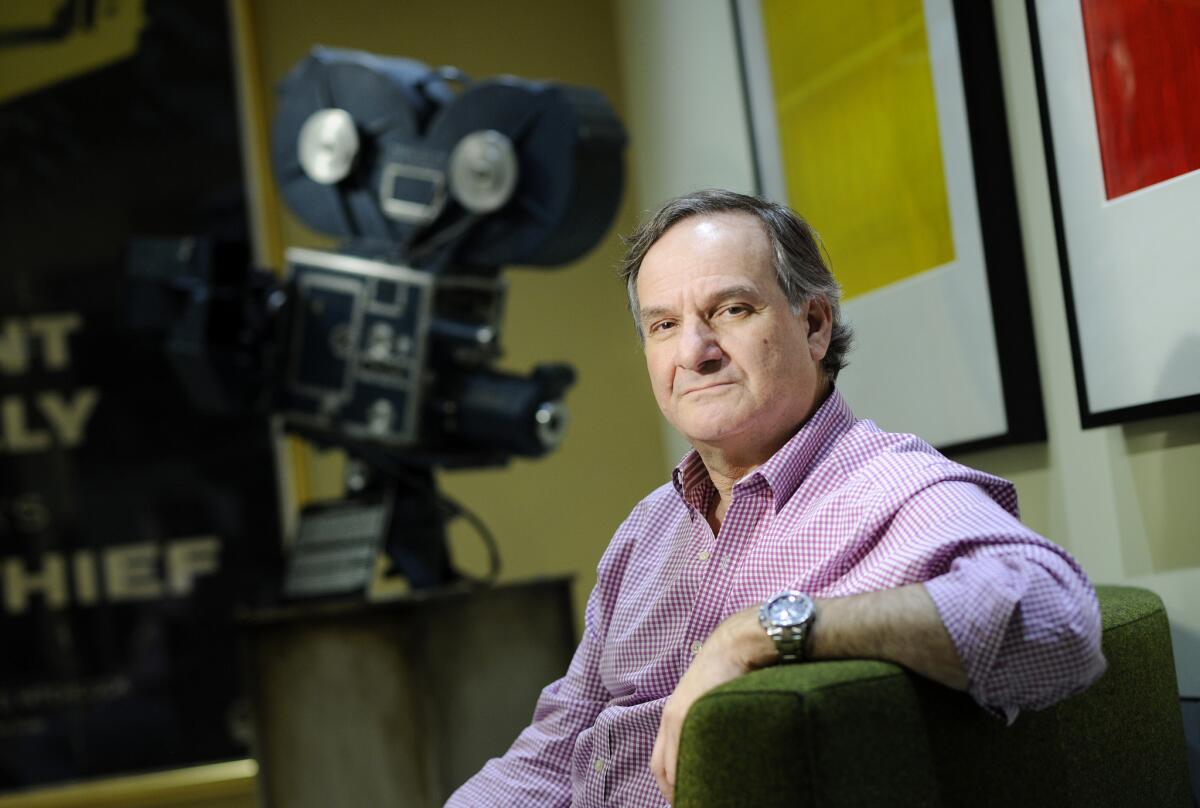
Robert Legato won an Oscar for visual effects with Mark Lasoff, Thomas L. Fisher and Michael Kanfer in 1997 for their work on “Titanic.”
Name: Robert Legato
Oscar: Visual effects [with Mark Lasoff, Thomas L. Fisher, Michael Kanfer], 1997, “Titanic”
Oscar: Visual effects [with Ben Grossmann and Alex Henning], 2011, “Hugo”
What was your greatest fear when you got called to the stage?
I couldn’t really prepare because it sort of feels like you’re going to jinx it. As luck would have it adrenaline, does kick in. It goes by like an instant. You have a million thoughts going on, and all of a sudden, you start speaking.
What was it like looking out on that crowd?
The first [win] is seared in your memory. In the front row was Warren Beatty and Jack Nicholson. There’s “Chinatown” and “Reds,” these two films that were very influential in my filmmaking life. Then you just have to start talking. You are not entirely in charge of your faculties.
Who did you forget to thank?
There’s three other people on stage who would love to say something too. I was trying to only thank the people involved in the film. But it’s like “Sophie’s Choice.” You’re looking at a clock coming down to zero and you’re just trying to be fair to everybody.
What was most surprising about the whole experience?
When I got offstage the first time, Garry Shandling was there to greet me. Then there are a bunch of photographers. It’s such a system. You feel like you’re part of this thing you dreamed about all your life.
What happened the next day?
You return to Earth pretty quickly. The first time, I went home — and it was garbage night in Pasadena — and I put the garbage cans out. We’d gotten jewelry from Asprey’s. My wife wore an $850,000 necklace, and I got some $35,000 cuff links. Nine o’clock in the morning, you turn back into a pumpkin. A guy with a briefcase comes in to collect the stuff from the night before.
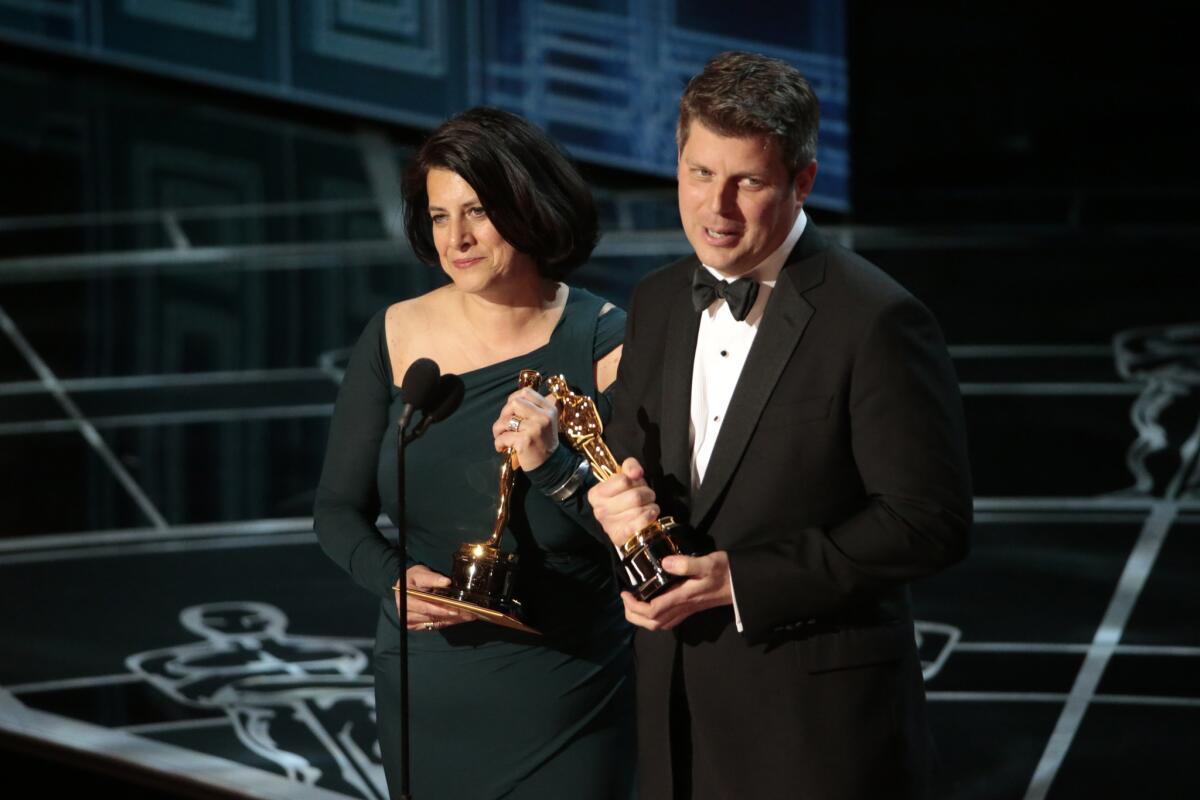
Anna Pinnock (set decoration) and Adam Stockhausen (production design) win Oscars for best production design for “The Grand Budapest Hotel,” during the 87th Academy Awards on Feb. 22, 2015.
Name: Anna Pinnock
Oscar: Set decoration/production design [with Adam Stockhausen], 2015, “The Grand Budapest Hotel”
What was your greatest fear when you got called to the stage?
Tripping over because you’re in these ridiculous clothes.
What was it like looking out on that crowd?
It seemed much smaller scale and quite calming being up there. I recognized people I knew, so I was trying to focus on them.
How did you prepare?
I’ve been three times before and lost. So I kind of knew the drill. The thing I find most terrifying is the art directors doing interviews at the Egyptian the day before. You are quite exposed. You have to talk for half an hour about your film. That was quite a challenge. You just go on automatic pilot.
Who did you forget to thank?
We agreed Adam would do most of the talking. At the end, I managed to thank Wes [Anderson]. I didn’t get to thank my people. Unfortunately, I was drowned out by the music.
What was most surprising about the whole experience?
The whole razzmatazz of the backstage. You prepare yourself for going up onstage and you don’t think beyond that at all. [Backstage] is just this enormous engine, and they’ve got a big barn full of press photographers on bleachers, and then you get taken up elevators through corridors, and you arrive in another room where there’s an immense press conference, and that again for me was totally unexpected. It’s almost worse backstage. In another way, you’re on such a high of adrenaline and happiness you do somehow manage to get through it.
What happened the next day?
I think we all went to breakfast. There were so many winners on the same film. We went to all the parties. At the Governors Ball, the statuette is actually engraved on the spot with your name. That’s the highlight of your evening.

Beverly Dunn, left, and Catherine Martin show off their Oscars for production design for “The Great Gatsby” on March 2, 2014.
Name: Beverley Dunn
Oscar: Production design/set decoration [with Catherine Martin], 2014, “The Great Gatsby”
What was your greatest fear when you got called to the stage?
I wasn’t prepared to speak first. It’s really so daunting as soon as you stand there in front of those bright lights and all those people. The theater’s so quiet waiting for some sort of line or something funny, which I don’t do. The moment I dreaded first was walking the red carpet. I happened to be behind Jared Leto. [After Leto,] we walk up and the cameras just go down. They’re like, “You’re not famous!”
What was it like looking out on that crowd?
You’re very wary of your time frame. You don’t want that music to play while you’re still standing there.
How did you prepare?
I didn’t really prepare anything. I think it’s a little bad luck to. The buildup is so much fun. The actual day, it’s a very long day. You start early with the hair and makeup. It’s such a short trip from the hotel to the theater, but the traffic is unbelievable. It takes forever to get there.
Who did you forget to thank?
Baz Luhrmann [the film’s director].
What was most surprising about the whole experience?
How long it is. And then when you go backstage, it’s another world back there.
What happened the next day?
I had to do a few live radio interviews for Sydney. I got up early without much sleep. But I was happy to do it so my fellow Australians could share the experience.

See what goes into catering the 2016 Oscars Governors Ball with Wolfgang Puck.
MORE:
Best picture predictions: It’s ‘The Big Short’ for the win
Oscars 2016: How to throw the ultimate viewing party (and no, it’s not too late)
Oscars 2016: A closer look at those ritzy award envelopes and their super-secret delivery
More to Read
Only good movies
Get the Indie Focus newsletter, Mark Olsen's weekly guide to the world of cinema.
You may occasionally receive promotional content from the Los Angeles Times.
